#uninhibited by the restraints of existence
Note
an analysis for an Heir of void please?
The Heir of Void [symbols: star, shadow]
The Heir class has its basis in the chosen one trope. An example would be Beowulf.
The Void aspect’s main theme is the unknown. You can find its official description here.
An Heir of Void is among those who explore knowing and perceiving. This is the “classpect group” they belong to. Members include: the Mage, Seer, Heir, and Witch of Void/Light. These classes are all opposites or inverses of each other that explore the Void/Light dichotomy (knowing and perceiving). A description of classpect groupings can be found here.
The Heir of Void passively manipulates the Void aspect. Passive classes are guided by others or act for the benefit of others. They are more likely to be kind, but less likely to stand up for themselves. Witches and Heirs possess great power over their aspect and everything it symbolizes that has been granted to them from an outside source. Simplified, the Heir of Void is motivated by others to manipulate the unknown.
In personality, the Heir of Void struggles with restraint, gets caught up easily, and is very independent. Personality descriptions can be found here.
Their archetype is the Child Spy, defined by uninhibited secrecy. Archetypes are explained here.
Their opposite is the Witch of Light, who actively manipulates awareness.
Their inverse is the Mage of Light, who actively knows awareness.
A classpect or “god tier” is an individual’s best self. All classpects go through a journey from unrealized, to struggle, to realized. When a character is unrealized, they neutrally exist as their inverse. On their struggle, they will wildly flip back and forth between their inverse and true classpect. In their worst moments they will act as their inverse, in their best their true classpect. When realized, they will stabilize as their true classpect. They will still have room to grow, but will become happier, more successful people.
This means that the Heir of Void begins life motivated by themselves to know awareness. When their struggle arrives and they are at their worst, they will continue this behavior in negative extremes. However, when at their best, they will find purpose in instead manipulating the unknown for others. When realized, they will stabilize and continue to manipulate the Void aspect passively, in a positive way.
They share their archetype with the Thief of Life, the Spy Child.
The Heir of Void would quest on a planet similar to the Land of Darkness [Heir] and Void [Aspect]. An example would be the Land of Rainclouds and Waves. An explanation of planet naming conventions can be found here.
Two possible gods, or denizens, to reign over their planet would be Nyx (Goddess of Night) or Poseidon (God of the Sea). Other Void aspect denizens can be found here.
When the Heir of Void completes their planet quests and dies on their quest bed, they would rise to ascension on the wings of bats (symbols of night). A list of soul animals can be found here.
The characters that I have currently classpected as Heirs of Void are: Equius Zahhak from Homestuck [canon example], Sten from Dragon Age, June from Dragon Age, Uncle Arthur from A Serious Man, Patrick Star from SpongeBob SquarePants, and Captain Haddock from Tintin.
If any of the links not connected to my blog break, the content can be found on my Google Drive.
Official Aspect Descriptions
Personality Descriptions
Aspect Denizens
#heir of void#god tier analysis#classpecting#homestuck#my post#ask#equius zahhak#sten#june god of craft#arthur gopnik#patrick star#captain haddock#dragon age#a serious man#spongebob squarepants#tintin
9 notes
·
View notes
Text
her elation feels like a tender apotheosis, as if her explosive jubilation were to continue, it would exalt her to the same celestial planes of her most venerated X’Hal. the sight of Donna safe will never feel less to Koriand’r than the pinnacle of joy, of the all-consuming glee to be graced with the sight of a redemptive, compassionate love shrouded in the guise of a dark haired woman with the likeness of stars gleaming along the undulations of her hair. they run to each other like the world hasn’t been burning, like the grime of war was not sullying Koriand’r’s lovely features and the solar flare of her skin did not ache with the pain of lesions and pure exertion. yet what did a collection of wounds matter when Donna was safe, when she was hers, when their arms twine like the dance of songbirds on the cusp of spring ?
Koriand’r holds her tight, at first, in her excitement. her excess is quelled as she feels Donna wince, softening accordingly to accomodate her lover’s exhaustion. “ Donna ... ! X’Hal’s breath, you are alive ! “ Koriand’r gasps out the proclamation of her existence like a hymn, her breathing pattern like the wrack of sobs expelling the agony of sweet triumph. her hands, still warm but not scorching from the use of her powers, traverse up across her back and against the side of her neck to reach a gentle cradle of her face. she prompts Donna to tilt up. there’s only a moment spared to gaze adoringly into her eyes, shaky pupils wide with adrenaline and a sincere reflection of their shared affection, before Koriand’r breaches the gap between their bodies and hearts with a graceful crane of her neck downwards.

the kiss with @troiyas is bliss incarnate. the act itself, to feel the joining of their mouths, was so routinary now and yet this instance felt unlike any other. it was a happy kiss, the happiest Koriand’r could ever have imagined having. it held both the rapture inherent of life itself, of realizing the worst was behind them and they had overcome, as it did the uninhibited pleasure of resting safely in the arms of your beloved.
there could be no true happiness in a world without Donna, not for Koriand’r who embodied passion and an expression of emotions untethered to earthly measures of propriety and restraint. thus, she rejoices in having her, tremorous yet whole, alive in the midst of a kiss neverending.
#troiyas#˗ˏˋ ⋆ koriand’r / ⅠⅠ . i’m still breathing#DO NOT SPEAK TO ME RIGHT NOW I AM ASCENDING#another win for the gays#˗ˏˋ ⋆ all alone in a corner of the night‚ fell in love with another burning bright . troiyas / donnakory#brb making you a tag for all our ships
4 notes
·
View notes
Text
Of the Wind
Summary: She’d been free, and then she’d been taken. She moved the wind, she made the wind, she was the wind.
Also read on: AO3
——————————-
Once upon a time, humans believed that all things had spirits.
Every tree, every flower, every mountain, every stream and lake and river…
Even the wind.
They were right.
The world teemed with life that most mortal beings would never see, and though some humans the world over continued to revere the invisible Souls of the Earth, many moved their reverence to the gods who made them instead.
But still the souls lingered, thriving in the rushing of water, the branching of tree canopies, the softness of grass, playing and running and laughing and living.
Some were as brief as a spring flower, some eternal as a mountain, but they had their place and played their part, living in perfect harmony, in synch with the ebb and flow of mortal life around them.
They were free.
The freest beings in the universe, free of the conventions of man or the expectations of yokai, they expressed every emotion they had without restraint.
But none so much as the wind.
The wind blew hard or soft or fast or slow, a contingent of happy souls following their currents, writhing together to move the trees, the waves, the seeds, even hair and clothes and leaves and stems.
The wind was sisters, sisters who giggled past ears like a sigh, brushed through hair to admire its softness, tangled together in endless heaps of giggling happiness, unfettered, unconfined, uninhibited.
They saw everything as they raced across the surface of the earth, traveled on the wings of birds, rushed through rising tides, and stormed past mortal houses.
They whispered their secrets and screamed their rage and laughed out their joy, moving all in existence with every breath they took.
It was a bright day, the kind the wind loves, with sun warmed grass to breeze through and fragrant flowers to whip up and relish when the wind was no longer free.
A swirling, elated mass of transparent souls whispered across the meadow, giddy as they communed with the nature souls, when one was snatched away.
She screamed for her sisters who rushed to her aid, but the wind has no hands to grab, to swords to wield, no feet to run, and when the Magics that took their sister disappeared in a streak of vile, black smoke, the dispersed in alarm.
The little wind soul wilted.
To live, wind must move, and there is always somewhere to go.
But the bubble of darkness she was trapped in was too small, too tight, too dark, nothing like the bright clearings or dense forests or raging oceans she was used too.
She was being snuffed out. So much still to do and see so many sisters still to love, and her life was being strangled baby something she couldn’t even see.
Between one breath and the next, she knew nothingness…
And then she knew pain.
She gasped in a deep, painful breath, new, empty lungs burning, screaming in protest, foreign limbs and muscles aching to move in ways she didn’t understand, and then a dark chuckle chilled her colder than winter.
“Ah, you have awakened.”
He knelt down, red eyes gleaming evilly as he stared at her.
He helped her sit up, held out a mirror, and she gasped again when she saw what looked back at her.
A face.
A mortal face, with eyes like roses and skin like snow, stared at her from within the glass.
She’d tried to see in one of these before, like the mortals she followed to ruffle their sleeves, and had seen all of nothing.
The wind wasn’t bound by bodies or forms.
But she lifted her hand, touched her cheek, stared in disbelief as the woman in the mirror reflected every move she made.
She shook her head, felt her eyes burn as liquid fell hot from them and traced down her cheeks.
And the man spoke again.
“Hello Kagura.” He purred, and she jolted. Was that her name? That’s not what her sister’s had called her. “I have given you form, a real body to live in, crafted from my very own flesh. Isn’t it lovely? You’ll have freedom to taste, touch, love. And in exchange, you need only serve me as your master.”
“Freedom?” She asked, confused by his offer. She had been free. Free and happy and alive. This body was painful, small, limited in what it could do and feel.
And she knew something about it was missing.
The man who sat before her smirked.
“Yes. I have gifted you true life and freedom. To keep it, I demand your allegiance.”
She seethed, rage burning hotter than the summer sun, but her new body struggled to contain it.
“You have taken my freedom and offer me a mockery in exchange. Why would I serve a fool such as you?”
He smiled, anger and hatred boiling in his red eyes as he reached behind him for a clay jar. He thrust his hand inside and squeezed something, and blinding pain bloomed throughout her body.
She fell back to floor and screamed until her throat was raw and bloody, begging him to stop, and when he did he grabbed her chin and forced her to behold him in all his vengeful glory.
“That, my dearest Kagura, was you heart. If you do not serve me, then I will destroy it, and with it, all your hopes of freedom and happiness. Are we understood? You will happily serve me, or you will die. You. Are. Mine.”
She gasped for breath as her hope curdled into searing anger.
This wouldn’t be the first time mortals tried to entice the wind. They would often hang colorful bits of paper or fabric to trees and houses, and she and her sisters would brush through them in delight.
Never before had she heard of one trying to imprison the wind.
Oh yes, he was a fool. She would make him an example. None would be so brave again.
And she was not his.
“No.” She struggled to speak through her ruined throat, voice hoarse and strangled.
“I am the wind.”
21 notes
·
View notes
Text
i’m completely of the opinion that you can argue that Mara didn’t die in the crash and is in fact (similar to Angella) stranded outside space and time (more on that in a different post lol)
what I’d like to whinge about instead is getting Mara back.
(angsty writing under the cut lol)
because we’re left with the impression of Mara that was left over from her various connections to Etheria, right? She left an imprint on Light Hope, in her memories; on She-Ra herself, in her appearance but also (judging by that interaction with that giant magical boar in 4x09) on Etheria’s relationship to She-Ra, its connection to her, in a way. The memory of Mara’s consciousness that Adora interacts with in the Heart is in some ways just that--a memory. An imprint.
Mara, though--Mara is trapped between dimensions. Outside time itself. If they manage to find her and “bring her back”, it will have been both eternity and only an instant. And Mara isn’t an immortal or angelic being--there’s no telling what that’s done to her body, not to mention her mind. If she completely lost her connection with She-Ra, if she lost all her magical abilities, or if they kept her alive, somehow, if not entirely untouched by the experience. (and I mean, I think this is at least partly the foundation for the fan theory that Madame Razz is Mara, but I mean. I want Mara to get to make that pie she promised Razz they’d make. ;_; )
If they somehow manage to “recover” Mara, I have a feeling the Mara that comes back wouldn’t be the composed, trained warrior that Etheria and Light Hope and everyone who’s seen their memories of Mara picture, fully in command of her abilities and entirely committed to her role as She-Ra of Etheria. Not the Mara who made her decision knowing she’d likely die alone, that she’d be remembered as a traitor, who didn’t even have a chance to mourn or process that her dear friend had been essentially replaced with someone else.
Maybe it happens by accident, as an outcome of trying to recover Angella--they thought she was dead, but she’s not, and Adora’s heart jumps, because maybe if they bring her back, someone can tell her about where she comes from, about who she is. At the very least, they can bring her back where she belongs. No one belongs lost like she’s been for the last thousand years.
But what comes back... isn’t the Mara Adora imagined. She’s... broken. More than a little mad, from experiencing something no mortal being is meant to experience.
But still absolutely furious. She never stopped fighting.
And it hurts Adora, seeing someone she looked up to so much like that. A hero. Someone who could’ve helped her, if she wasn’t so broken by everything she’s been through.
And maybe it takes a combination of Madame Razz and Adora to even get Mara calmed down enough that they can bring her back with them--and they don’t know what to do with her once she’s there. What do you do with such a powerful being who’s so profoundly wounded?
And then she sees Light Hope.
Light Hope, who spent the last thousand years trying to forget her, to erase her from her memory, but couldn’t. Who almost couldn’t bear existing with the grief of knowing what she‘d done to Mara, to her charge. To someone she’d loved. Who touched her so profoundly it broke the limits the First Ones embedded so deep into her it might as well be in her DNA. The person who made her able to act in ways that directly contradicted her core directives--able to defy them, finally. Mara would not want me to-- Light Hope says, when Adora reminds her that Mara cared for her, believed she was more than what the First Ones ever imagined she could be. Maybe, she thought as she slipped the restraints her architects built into her, she’d done something that would make Mara smile. She might not be able to forgive herself, but the Mara she knew was so kind, so kind it turned her into an entirely different being. Mara was a healer, someone who saw the potential in people, who saw what they could be, and brought that out in them.
The worst part is knowing that Mara would’ve understood and forgiven her. And Light Hope all but killed her.
And, impossibly, Mara came back. Maybe, Light Hope thought on some level. Maybe. She can’t let herself finish that thought.
But even though Mara’s hurt, even though she’s been changed permanently by what she’s been through... Mara was so Mara that their superiors’ attempts to control her failed. If she’d survived that intact, then being outside time itself couldn’t change that about her. Maybe...
Light Hope is just there, when she’s brought in, just observing--just wants to see. Adora told her she could be here for this. Thought maybe it would help Mara feel like she was somewhere familiar again.
Mara sees her and freezes. Utterly still, for the first time since they brought her back into the realm of being.
And then she explodes into motion, her reaction so pure and intense she manages to slip free of Adora and Razz and Glimmer and Micah and however many sorcerers they brought with them for a few heartbeats.
They manage to restrain her before she’s able to do any real damage--she’s as powerful as Adora and completely uninhibited in her use of that power now, so there’s at least a dozen of them, all focused completely on Mara, but she still manages to get past them--and Light Hope won’t ever forget the rage and pain carved into Mara’s face. The enraged flare of magic in her eyes, written into her limbs.
All directed at her.
Mara was a warrior, Light Hope remembers suddenly. Their superiors chose her for that, not her heart. Her heart wrecked everything, couldn’t be controlled. But that wasn’t what recommended her to them, over all the other candidates.
You, Mara spits, in a language Light Hope hasn’t heard in a thousand years, her voice almost beyond recognition. You. I'll never forgive you.
That’s the problem with bringing heroes back from the dead. Light Hope can’t unsee or unhear that moment, Mara changing in an instant from the woman who loved Etheria enough to lay down her life for it, who went stargazing and berry-picking with old women in the woods, to something more than human. From the woman who loved her and believed in her and never stopped trying to convince Light Hope to break free, even right up until the end, to denying her the one thing she’d been able to imagine was a certainty.
She could imagine that Mara would’ve forgiven her, until Mara was there to tell her in exactly so many words that she never would.
... of course, at least part of that would be because Mara thinks this is still not!Light Hope, but it’s not like she’s in a position to make that clear at the moment.
(so ideally this would be a recovery fic with some kind of happy ending lol, but that image in particular is just SO ANGSTY)
(and I absolutely want Mara to get to make that pie she promised Razz they’d make. And go stargazing at the repurposed Crystal Castle again. And for Light Hope to get to genuinely take care of Mara for the first time in maybe ever, with no surprises or secrets waiting for either of them, or hidden agendas. No one trying to control them.)
#marahope#spop#headcanon#angst#hurt/comfort#but like... the hurt before the comfort#definitely#whump#emotional whump
12 notes
·
View notes
Text
Messy, Perfect Redemption: Dazai
My least favorite trope in fiction is probably redemption via death. It just seldom works for the best possible story and more often than not comes across as an author wanting to take the easy way out with having now made the audience like the character, but not having to deal with the repercussions with their relationships with other characters and actual work of changing. Which honestly is also fair. Writing is hard.
But one of the things I love about Bungou Stray Dogs is how the entire story is basically Dazai’s redemption arc in all its disastrous messy glory. Redemption is hard, becoming a better person is exhausting and it doesn’t happen overnight. Despite an often cavalier attitude towards everyone around him, Dazai never loses sight of Odasaku’s last words to him.
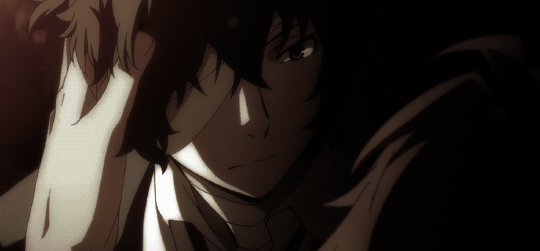
"Listen. You told me that you might find a reason to live if you lived in a world of violence and bloodshed. You won't find it. You must know that already. Whether you're on the side who kills people or the side who saves people, nothing beyond what you would expect will appear. Nothing in this world can fill that lonely hole you have. You will wander the darkness for eternity. (...) Be on the side that saves people. If both sides are the same, become a good man. Save the weak, and protect the orphans. Neither good nor evil means much to you, I know... but that'd make you at least a little bit better. (...) Of course I know. I know better than anyone. Because... I am your friend."
Leaving the mafia and deciding to save people from now on is a good step, but it’s a process, as we see. It’s choosing every day to save orphans, to protect the weak, and even after making the overall choice to become a better man, there are still plenty of struggles along the way. It’s what makes Dazai such a compelling, powerful and ultimately hopeful character for me.
I know Atsushi is often seen as representing Dazai’s second chance after Akutagawa, his redemption in a sense, and that’s not wrong at all. Atsushi is definitely a major, even the main, part of it, but in my opinion it’s not the whole of it. Dazai’s mentoring of Atsushi is a double-edged sword: on the one hand, it absolutely is a part of his redemption. He’s genuinely trying to do his best with Atsushi, and I do think he cares for him--clearly, he cares enough to let himself be captured by the mafia, even.
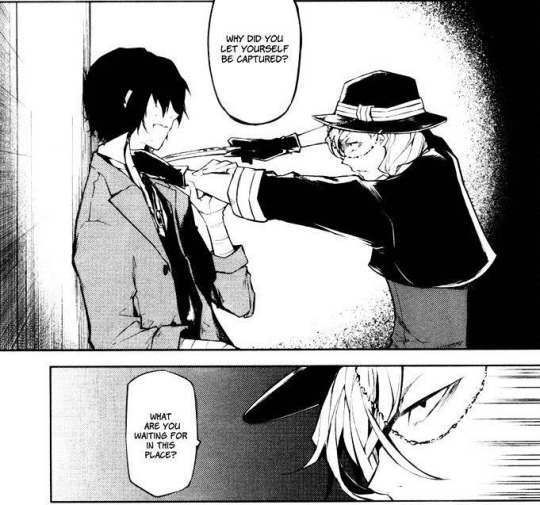

On the other hand, ignoring a kid you hurt for a kid you didn't is not redemption in and of itself when you could still do something about it. It’s not like Akutagawa has given up on Dazai in any way; he’s pretty desperate for Dazai’s acknowledgement even now.
If saving one requires you to abandon the other, are you really a better person for it ? Like, if you wanna save orphans, you kinda have to include the one who's literally begging you to save him and who is only in this bad place because of you.

If joining the agency would have redeemed Dazai, we wouldn’t have a story, though again I’m not minimizing the importance of this or the resonance of Dazai’s mentoring of Atsushi. But in joining the agency, Dazai left someone behind--more than one someones, actually. Dazai’s redemption is a process that will require him to face the harm he caused in the mafia and as much as possible, fix it. And he can’t fully redeem himself until he integrates with his shadow. Unlike Atsushi whose shadow is directly personified in Akutagawa, though, Dazai’s is in several other people (we could also consider Odasaku and Atsushi part of the anima), including Akutagawa, Chuuya, Dostoyevsky, and Mori.
Even the next time Dazai saves an orphan (Kyouka), we find out that a lot of the cruel ways Akutagawa trained her came from how Dazai trained him.
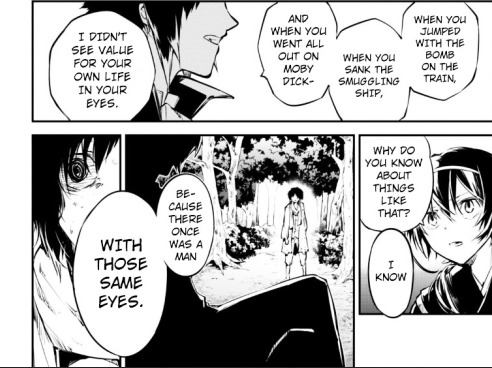

It’s a consequence coming back to Dazai that his mentee decides to save a child trapped in the mafia whom everyone wants to give up on, a child whose been through the same training he forced Akutagawa into (which I should remind you includes a canonical mock execution). The difficulties of saving Kyouka are probably exactly why Dazai took so long to make baby steps towards Akutagawa. But to his credit, while he’s not exactly compassionate with Kyouka while she’s imprisoned, Dazai does save her. If mentoring a kid on the verge of turning into a criminal is the first step to reconciling with his mafia self, then Dazai’s helping save Kyouka is the next one.
However, he doesn’t fully understand the cruelties of he did to Akutagawa, as shown in how he mocks him after his capture by repeating Akutagawa’s worst fears to him:


I know Dazai’s playing a long game with setting up Atsushi and Akutagawa’s partnership in shin soukoku, but the ends don’t always justify the means and that’s a lesson often shown to us in BSD (it’s in part the reason Dazai left the mafia; he couldn’t buy that Oda’s death was justifiable because it got rid of Mimic and got the Port Mafia their black ticket). This type of triggering really isn’t okay. Like I said here, Dazai is in part the cause of Atsushi and Akutagawa’s struggles to get along, and he should be part of reconciling that schism as well.
I know while some people are annoyed that fans call a person two years older than someone else their father figure, but the manga itself draws this comparison and codes Dazai/Atsushi and Dazai/Akutaqawa as a mentor/mentee relationship which is 99% of the time coded as parental in literature (and it definitely is here). Akutagawa literally draws the comparison himself between his relationship with Dazai and Atsushi’s with his abusive orphanage headmaster. Yes, Akutagawa’s making some logical jumps here (refusing to acknowledge that Dazai is just as much Atsushi’s mentor as his), but the manga wants us to make this comparison.

As Atsushi wasn’t able to reconcile his frustration and hurt towards the orphanage headmaster, he’ll probably do so through Akutagawa and through Dazai, because Atsushi’s view of Dazai is basically that he’s already redeemed and fantastic and justified in his choices--again, I know Atsushi complains about his irresponsibility sometimes, but it’s mostly played as a joke and isn’t a serious critique of just how he treated Akutagawa, despite Atsushi hating Akutagawa for how he treated Kyouka (take that train of thought a little further, Atsushi).
But onto Dazai’s other relationships. It’s telling that Dazai is at his most unrestrained and violent in the mafia when he partners with Chuuya, who despite being very restrained thanks to him being capable of uninhibited destruction that would lead to his own death without said restraint, knows who Dazai is and what he’s capable of from the very beginning (he’s so much as seen Dazai murder the orphans who comprise the Sheep even after promising Chuuya he wouldn't). Kunikida is Chuuya’s foil in that he works most closely with Dazai in the agency and is perpetually ready to strangle him, but Kunikida is also incredibly principled and restrained--yet he is significantly the only member of the agency who, prior to the Guild Arc, did not know Dazai used to be in the mafia.

Kunikida’s ideals including saving everyone if possible. Both Chuuya and Kunikida represent these two extremes of what Dazai is capable of--and yet notably both of them care about saving children and are in many ways more compassionate people than Dazai.
The one time we see Chuuya talk about killing a kid is with Q, who notably is introduced to us as another child with the soukoku partnership team-up.

Q, a child with half-dark hair and half-white hair (gee I wonder what that symbolizes) is a child made to curse the world and hate ever being born. Chuuya and Dazai team up to save him but contemplate killing him.

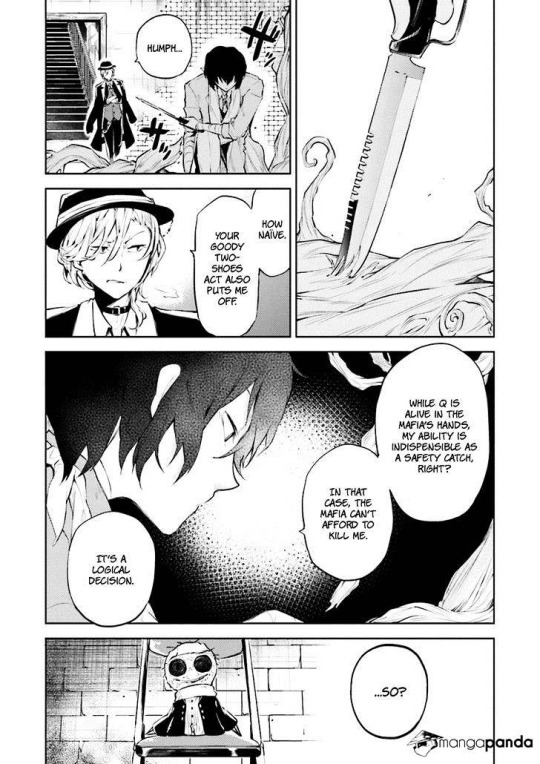
Dazai’s choice not to kill Q is stated to be to save himself, which is probably is, but it’s also symbolic of how Dazai’s saving other people is saving himself (and also ties back to another quote Odasaku liked to repeat from Natsume: “everyone exists to save themselves”).
But Chuuya’s motivation, as I wrote before, is because he’s grieved over the loss of his comrades. Chuuya really cares about people, including Dazai, and the fact that Dazai is actually going to far as to model Atsushi and Akutagawa’s team-up on his team-up with Chuuya pretty strongly implies Dazai doesn’t hate Chuuya as much as he says he does. To be able to truly leave the mafia, he has to make peace with those relationships there. It’s part of being honest with himself: like Atsushi, acknowledging the darker shadows, and like Akutagawa, acknowledging the better parts of him too.
At present, Dostoyevsky proves a perfect foil for Dazai, as @linkspooky has written here. They’re the same in a lot of ways, but Dostoyevsky has allowed nihilism and a god complex to completely consume him and is not trying to be human, whereas Dazai still tries to save people and was devastated by Oda’s death. Dostoyevsky’s ability, whatever it was, works by touching someone like Dazai’s, but since Dazai’s No Longer Human negates another’s abilities, Dazai is the only person on which Fyodor’s ability will not work, making them the perfect counters for each other. Dostoyevsky is what Dazai could be if his feelings of alienation from human society (a prominent theme in the real life Dostoyevsky’s works) were taken to their utmost extreme, and so it’d be fitting for him to ultimately defeat Fyodor through the relationships he does have (including Atsushi and Akutagawa).
To return to Odasaku, Odasaku is also kind of a warning to Dazai as much as he is a man Dazai wants to become like. When Odasaku lost the orphans under his care, he fell into complete despair and knowingly embarked on a suicide mission to do what Mori wanted him to. Still, Dazai tried to save him. He wasn’t able to save his life, but Odasaku’s death saved Dazai. Yet it’s potentially concerning that Mori used Odasaku’s human connections to engineer his downfall, and I wouldn’t be surprised if Mori uses Dazai’s to try to engineer his downfall later on (like, way, way on).
The difference is that Dazai is a good foil to Mori, too, in understanding what makes people tick and always thinking several moves ahead. Mori groomed Dazai from the age of like fourteen (or younger) to be his successor in the mafia, manipulating his suicidal tendencies and hopelessness to get what Mori wanted from him. It’s telling that the earliest we have of Dazai is him with Mori, in that Mori instead of caring for a suicidal patient decided to take him along to murder the mafia’s boss and induct him into the mafia thereby. The thing about Jungian stories is that there are often some Oedipal tendencies to them--like, for example, a character needs to overcome/break away from completely/kill their father. I can see Dazai at some point having to overcome Mori and his influence to cement his arc, but that’s highly speculative (yet fits with Mori’s build up as a villain), so we’ll see.
#bsd meta#bungou stray dogs#soukoku#dazai osamu#shin soukoku#akutagawa ryunosuke#nakajima atsushi#oda sakunosuke#mori ougai#fyodor dostoyevsky#izumi kyouka#nakahara chuuya#bsd theory
603 notes
·
View notes
Text
Shigaraki and the Pleasure of Destruction
“Central to the effect and fascination of horror films is their fulfillment of our nightmare wish to smash the norms that oppress us and which our moral conditioning teaches us to revere.”
-Robin Wood
Shigaraki’s backstory in BNHA is marked with excessive violence and outpouring of bodily emotion, bodily fluids, and bodily destruction. This destruction and excess arise as a reaction to the stifling paternalistic system under which Shigaraki / Tenko is subjected and abused. Horikoshi conveys the violence as a scratching of an itch – the relief of a persistent sense of discomfort. The destruction is repeatedly portrayed as a pleasure to Tenko – a pleasure that arguably extends to the reader who occupies his perspective. This post uses horror film theories to argue that Shigaraki’s pleasure in destruction comes from bliss and catharsis in destabilizing the oppressive system he and the reader are subjected to, and takes relief in abandoning socially sanctioned behaviour.
[Author’s note: This reading zooms in on chapters 235 & 236 only. Points here are made as opinions and hypotheses, not statements of fact, i.e. this is just one way of reading the text. Most theories cited here apply mainly to analysis of Western horror films; yet I cite these ideas believing they are applicable here, given the chapters’ horror elements, and American media’s partial influence on BNHA. This discussion covers aspects of the Japanese family unit and attributes some influence to Confucianist thought. This is not an attempt to disparage another culture, because I am, unfortunately, also subject to a society informed by such codes – filial piety especially. If you believe it is within your jurisdiction, critique where necessary.]
The Symbolic System of the Paternalistic Family Unit
Tenko’s destructive outburst is a reaction to the symbolic system of his Father’s household. Here, ‘symbolic’ is a term used to refer to that which acknowledges and abides by cultural and social laws and rituals [3]. In the microcosm of the Japanese nuclear family, the father is the daikokubashira (the man of the family, the central pillar on which the family leans on) [7], and Tenko is subject to paternalism, collectivism, and conformity. This helps us understand why his father has such a strong hold over his family – his power is not just financial; paternalism is deeply ingrained as a sociocultural norm:
In traditional Confucian thought, women were inherently subordinate to, and were expected to serve and obey men. This form of female subordination to male dominance and authority supports the social belief that males were responsible for protecting, defending, and guiding those inferior to and dependent on them. As Sugihara notes, “[T]he Confucian ethical system emphasizes a harmonious society in which a hierarchical structure is maintained…which assumes… men’s dominance over women and children.” [4]

The opening panel establishes the house which five-year-old Tenko is subject to. The home – both the physical space and the social ladder of the family – is an ordered system literally and hierarchically built by his father.
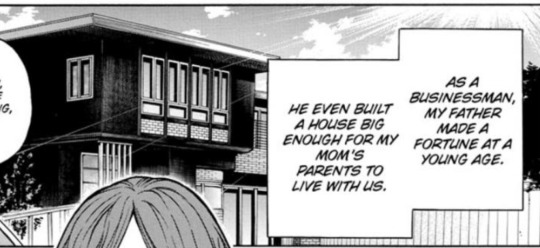
This is fact is continually reinforced each time a restriction or punishment is imposed on Tenko, emphasizing his suffering as a result of his father’s heavy-handed rule.
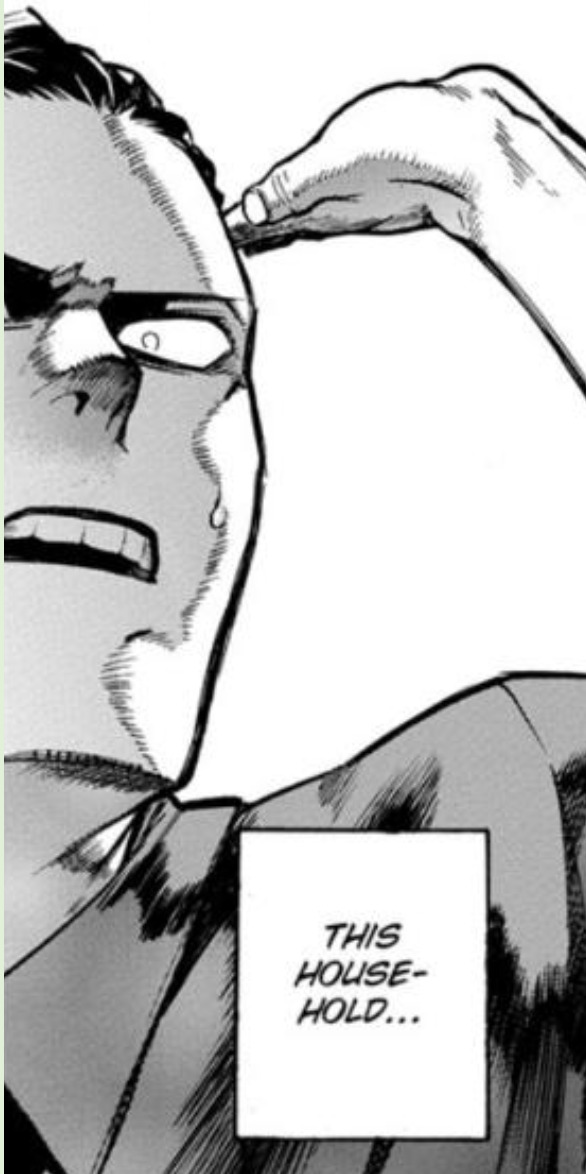
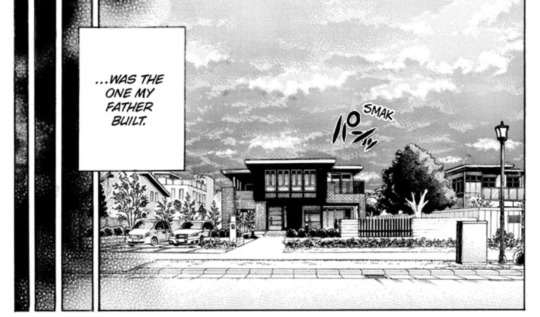
It is a house run on order, reason, and restraint, which necessitates repression and discipline. Shimura Kotaro’s rule against heroes appears a logical outcome of his own childhood experience of abandonment by his mother Shimura Nana – it is a restriction imposed to minimize risks to his family. This prohibition represses his own boyhood desire for his mother (suggested by his emotional response to her letter) and this repression is extended to and projected onto Tenko.
But unlike the adult Kotaro who is repressed and seamlessly interpellated into this symbolic system of discipline, Tenko is a child, and therefore immature – more impulsive and driven by infantile want (“children are more self-centred and straightforward than one would expect”) – his simple desire to play hero transgresses the order of the home, specifically, the rule against heroes. He is disciplined for this, leading the reader to view the symbolic structure as unfairly repressive, authoritative, and disciplinarian.
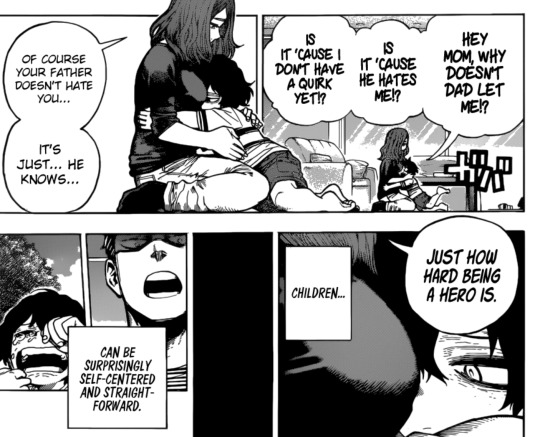
Tenko’s rule-breaking is not the only way the text demonstrates his segregation from his household. His difference and emotional turmoil manifests physically as excess outbursts of bodily fluids, bodily movement, and sound (these notions of “bodily excess” are derived from Linda Williams [5]). In other words, the text clearly shows us that he does not fit into his home’s strict system through:
Excess bodily fluid & discharge: tears, mucus, and broken skin from scratching, vs. the relative cleanliness of the house, and the complete, stable, contained appearances of his other family members
Excess bodily movement: scratching, flailing and shuddering, vs. the controlled stiffness and posture of his father’s bodily movements
Excess sound: weeping, shouting protests, begging for mercy vs. the communal silence and denial of his mother and maternal grandparents, who only protest quietly and ineffectually, silently consenting to “taking [his father’s] side”
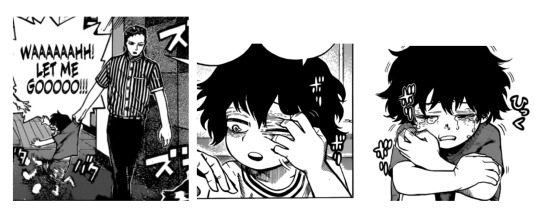
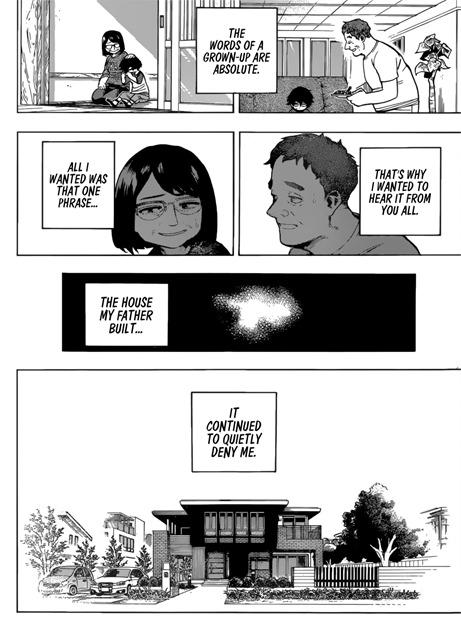
Of these tics and mannerisms, most notable is his itching – the clearest, most visceral manifestation of his bodily and emotional discomfort. The blemishes on his face visually mark him out as the odd-one-out in his family, the broken skin gives clear indication that he is in bodily pain. This uncomfortable affliction is a direct result of his father’s abuse and his family’s non-interference: it arises only at home, and he scratches most violently when his father’s violence (and family’s ‘betrayal’ of complicity) reaches a climax:
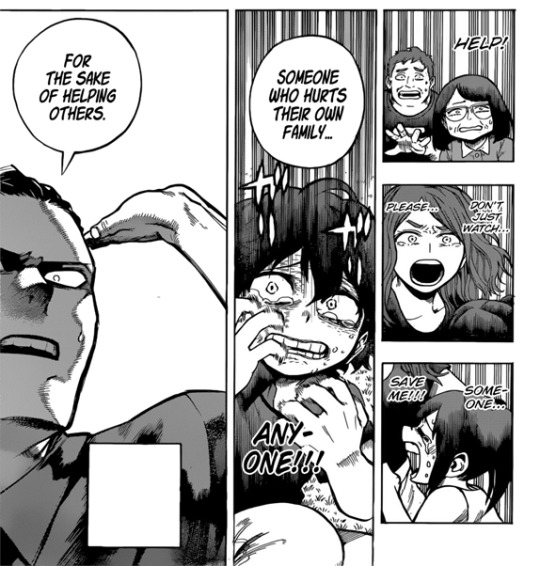
Tenko’s bodily excesses are physical materializations of his painful emotional slippages from the system. In other words, it is as if his (invisible) pain is rendered visible as material symptoms; as if the restrictions imposed on him literally hurt him and draw blood. This is somewhat relieving to see as a reader because when emotional pain is so clearly materialized and visible, it is an affirmation and validation that it exists – it is something you can see and feel, and is therefore undeniably real. In short, Tenko – simply by being himself, true to his immature desires and without the ability to repress this – is oppressed by his father’s household, which is run by a symbolic system of order. While this demands one’s body to be stiff, controlled, sanitized, clean, presentable, and containable, and behaviour to be quiet, compliant, and submissive, Tenko's excess of emotional thrashing, crying, bleeding, scratching and protesting is a clear transgression of this. As punishment, he is frequently expelled from the house – an individual outcast from the system.

The Pleasure of Bodily Excess and Destruction
As a result of his natural childish desire and bodily excess, he is not ‘symbolic’ – that which abides by the social code – but ‘abject’: that which does not respect borders, positions, rules, and disturbs identity, system, order. [3]
“The abject threatens life, it must be radically excluded from the place of the living subject, propelled away from the body and deposited on the other side of an imaginary border which separates the self from that which threatens the self” [3]
As mentioned, I’m employing theories used in analysis of horror films, which typically portray battles to reject and disavow the abject threat of the monster, to push them safely over the border to protect the symbolic self. Under the symbolic system of his house, Tenko’s father delineates the boundaries, i.e. borders, of the house; he retaliates when Tenko crosses the boundary into his private study, expelling and quarantining the abject, rule-flouting Tenko to the yard.
This scene of discipline and restoration of order happens in garish daylight, under which people, actions, and the ordered space of the home is illuminated, visible, comprehensible. This gives way to night as we move from chapter 235 to 236: under the darkness and low visibility, things become incomprehensible, nightmarish, and a dream-like fantasy of vengeance unfolds.
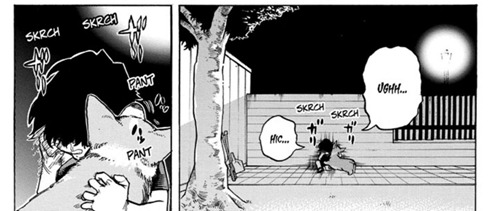
This section asserts that the horrifying spectacle of Tenko’s unbridled destruction of his family and home is pleasurable for him and the reader because it is the moment he cathartically destroys the symbolic system that oppresses him, and all who are complicit.
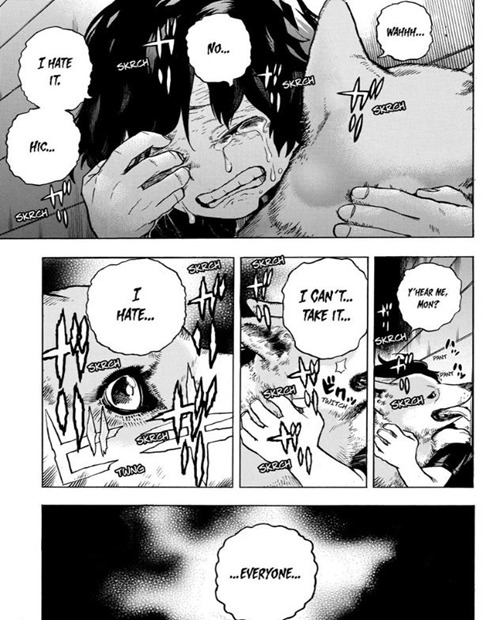
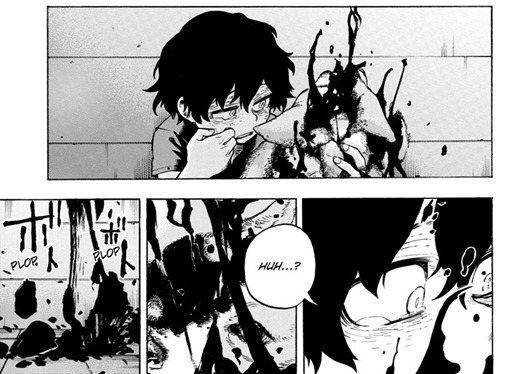
The first death enacted by his quirk is gory, unexpected and alarming. We share Tenko’s distress because it is uncontrollable and accidental. As it comes right after he pitifully despairs that he hates his whole family, Mon-chan’s demise is almost seen as a result of that hatred; it is as if his emotional, immaterial pain and itch for vengeance has finally taken material form, become a physical force, through his newly manifested decay quirk. Thus, even though panicked, there is an arguable degree of relief at this release of a pressure valve, and the deluge that follows is extreme.
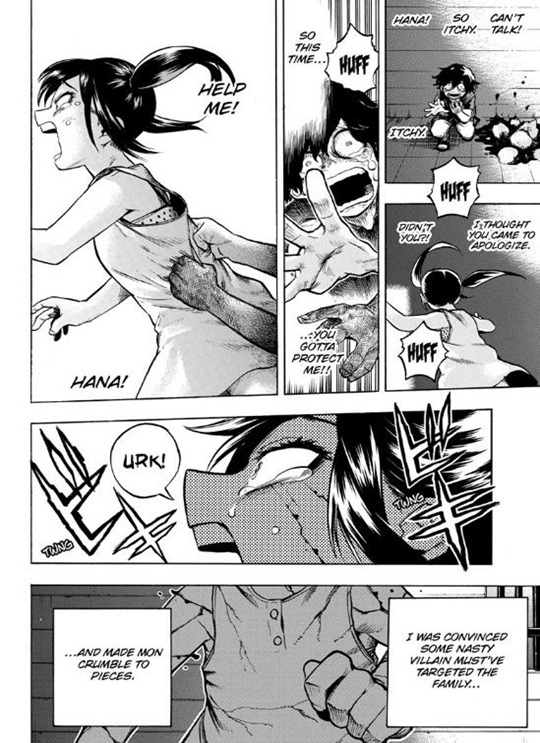
The first person he kills is his sister. Previously she was positioned as a sort of helpless and fearful conspirator – she understands and navigates the symbolic system well: she lies to their father that she wants to be a housewife instead of a hero, and lies again about Tenko initiating the break-in to his study – and had managed to dodge punishment and remain mostly in her father’s favour. She had been allowed to remain safely inside the house while Tenko was expelled – physically and socially. Here however is a terrifying spectacle in which she comes to mimic his bodily excess – she cries, screams, bleeds just as he does. Because Tenko’s internal dialogue here begs for her to protect him as she failed to before, Hana’s destruction is possibly Tenko’s unconscious, uninhibited, primal desire to punish her for betrayal – to unify the both of them under his pain.
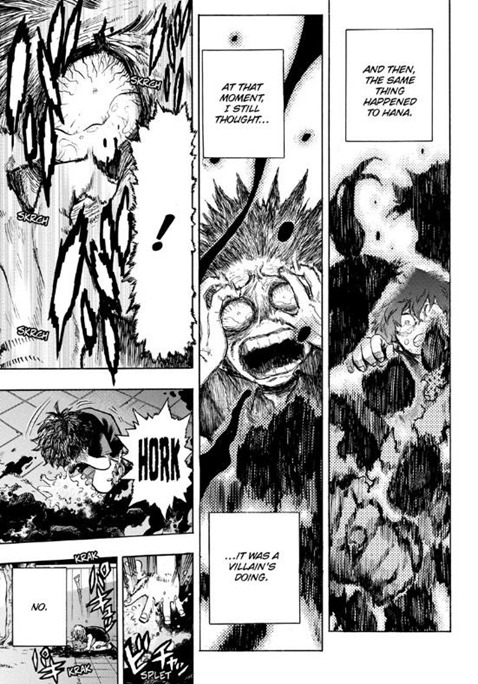
As the blood and gore escalates, so does Tenko’s own bodily excess. Speech breaks down as his voice does; a panel of his face contorted in an anguished scream as hair stands on end, eyes wide and bloodshot, vividly exhibit this emotional deluge and breakdown of sense and communication; a panel gives an uncomfortably close-up shot him clawing at his itching skin, drawing blood; he vomits loudly, uncontrollably, he trembles, shudders. His body releases, spills, spews excess emotion, fluid, destruction – manifestations of the extreme emotional pain and malaise that he’d built up from abuse, swelling inside him to a burst of excess spillage. This is further confirmed in his destruction of his mother and grandparents:
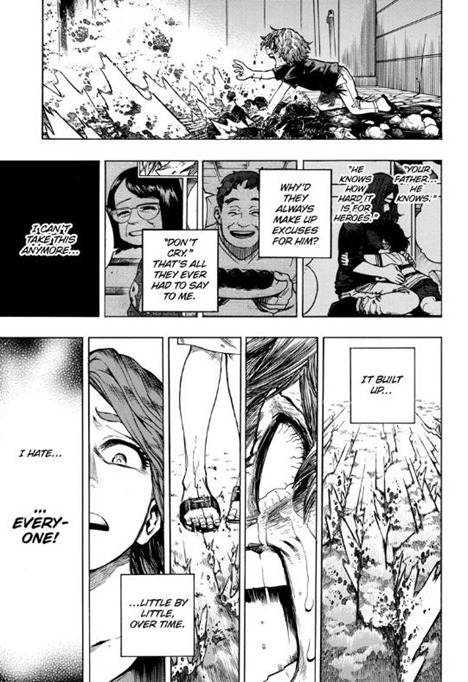
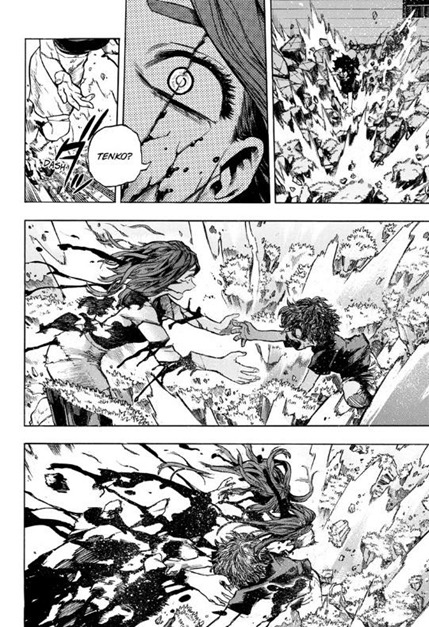
He explicitly demands to know “Why did you take dad’s side?” and professes his pent up fury toward their docile submission, leaving him to suffer alone. He reduces their whole, presentable, bodies to unsightly, dismembered corpses, and thereby reducing them to the same abject defilement as himself; he wipes away the patient, chastising comfort from their faces to elicit the reaction he had desired from them in his moments of need: panic and alarm. In this act, the communal silence towards his abuse is finally transformed to mutual suffering, screaming, and bloodletting.

The Pleasure of Destabilizing Social Norms
Linda Williams asserts that horror is a genre that can “address persistent problems in our culture […] violence & emotion are a cultural form of problem solving” [5]. In Shigaraki’s backstory, domestic violence is the problem, and violence in equal or excess measure is the solution (while his mother and grandparent’s non-violence did not work against his father). Paternal control over the house is the problem, and a complete obliteration of that system and house is the solution. Furthermore, Tania Modleski cites Roland Barthes’ notions from “Pleasure of the text” to argue that contemporary (Western) horror films abandon plasir (pleasure from confirmation of one’s subject position i.e. confirming your perspectives, values of the world and your place in it) and instead offer jouissance (bliss from dismantling and undermining of one’s subject position; indulges in destabilization, pleasure of destruction, allows abandonment of normal modes of thinking) [6]. This is the pleasure Tenko describes when he fully indulges in the climactic act of destroying his abusive father and entire house, and in doing so, frees himself from subjection to the symbolic system.
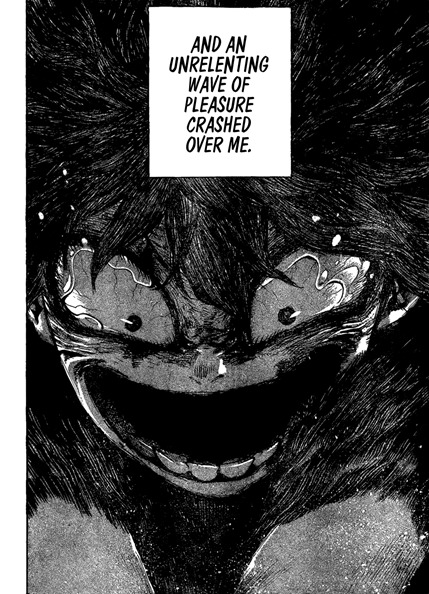
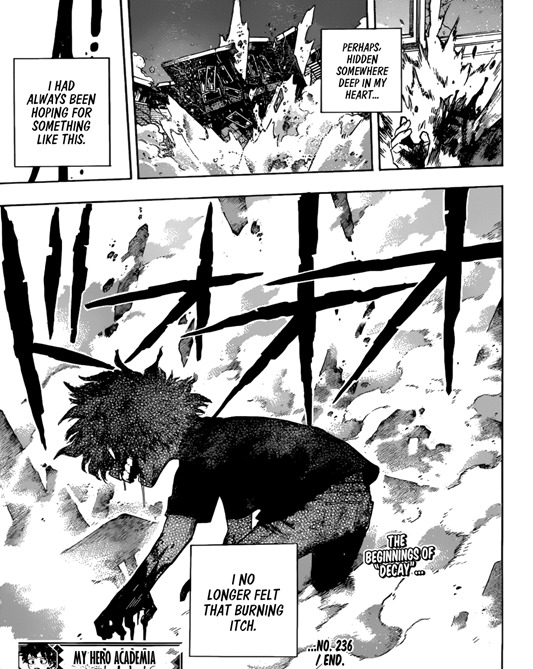
In a wider context, the family is a basic unit (and microcosm) of Japanese society, and the anxieties of said society are visualized through kaidan – ghost or horror stories. In such stories, the child ghost / monster conveys a fear of the young’s disregard for and role in destroying the family:
In an interesting twist to the cinematic kaidan tradition, contemporary films' exploration of these familial and larger social anxieties revolves around the figure of the monstrous child ghost. In these films, the traditional figure of the adult female onryō is supplanted by a terrifying teen or preteen wraith. These films' representations of children and young adults transformed into disgruntled, vengeful, supernatural entities after (perceived) betrayals by their parents hints at dominant Japanese concerns that the growing dysfunction and disintegration of traditional familial and social structures have led to the emergence of a new generation of young people who have taken on distinct, potentially problematic identities, including otaku, the shojo, and the kogyaru, which are characterized by a detachment and disengagement with the larger (often adult) community. [...] Where earlier incarnations of the onryō were either appeased or vanquished after attaining vengeance (Oiwa, Okiku, and Lady Mamiya), contemporary onryō defy all attempts at containment; instead, their hunger for destruction is presented as infinite, perhaps reflecting society's deepest fears about the immature, unsocialized youth generation's incoherent and uncontrollable appetites. [4]
Thus, I read Shigaraki’s backstory as a fairly relevant presentation and critique of societal fault-lines – in particular, the hurt and dysfunction caused by unchallenged abuse of paternal, patriarchal power, possibly enabled by a society and family unit guided by Confucianist thought and ideology, including respect for parents, community over self, social harmony over personal indulgence among others. Tenko’s failure to contain the emotional burden of his abuse under such an environment, one that overflows in a deluge of excess bodily emotion, fluid, movement and force of destruction – offers jouissance through destabilizing the structure that binds subjects to the moral and social obligations of the paternalistic nuclear family.
Arguably, the reader, forced to occupy Tenko’s perspective, experiences this pleasure vicariously. This monster child of sorts represents the kind of infantile and primal urge we suppress, fear, and reject. Through this fictional surrogate, we gain access to the act of fleeing moral conditioning and destroying the paternal / creator / rule-maker and his system, thereby liberating us for self-determination, self-definition, self-rule. Through this explicitly visceral excess, we are caught in his euphoria of empowerment and destruction, in a sort of involuntary mimicry. It is a power fantasy of subverting the hegemony that dominates.
Liberation to a Limit
In the wider narrative of BNHA, this liberation from the symbolic system is arguably limited. The chapters detailing his escape from the system are aptly named “Shimura Tenko: Origins”.

His identity under his family and thus his family name are abandoned, and he is reborn as Shigaraki Tomura. The sequence of chapters suggest a progression from oppressed subject Tenko to liberated Shigaraki. However, given the fact Shigaraki is named and guided by All-For-One, it seems as if this merely substitutes one paternal figure for another. Perhaps subsequent plot developments might offer some opportunity for his self-determination, under an identity and following a path that he himself constructs. We can only wait and see.
References
1. Horikoshi Kōhei, “Boku no Hero Academia (僕のヒーローアカデミア)”, Chapter 235-236.
2. English-translated manga screencaps obtained from VIZ <https://www.viz.com/my-hero-academia>; Jamini’s Box <https://jaiminisbox.com/reader/series/my-hero-academia>; and cross-referenced to mangastream <https://readms.net/manga/my_hero_academia>.
3. Julia Kristeva, “From Filth to Defilement”, Powers of Horror, 1982.
4. Valerie Wee, Japanese Horror Films and their American Remakes, 2013.
5. Linda Williams, “Film Bodies: Gender, Genre, and Excess”, 1991.
6. Tania Modleski, “The Terror of Pleasure: the Contemporary Horror Film and
Postmodern Theory”, 1984.
7. Thank you Luka for informing me of the term, translation help, and proofing.
#shigaraki tomura#shimura tenko#meta#bnha#boku no hero academia#shimura kotaro#bnha manga spoilers#works#歪#啊啊啊生活好幸苦
185 notes
·
View notes
Video
youtube
CARLY RAE JEPSEN - WANT YOU IN MY ROOM
[7.80]
Give a [10]! or a [4]! We don't care! Anymore! (actually we clearly do care)
Josh Winters: The sound of the heart set aflame.
[10]
Tobi Tella: Oh my god. The synths, the sultriness, that goddamn HOOK. Dedicated had a lot of great and fun, pop music, but this comes out of left field in the best possible way. It's one of the most direct and sexy things, she'd ever done. Is this what gay heaven feels like?
[10]
Wayne Weizhen Zhang: Big "looks-up-grinning-like-the-devil" energy: when CRJ sings, "I wanna do bad things to you," the mischief is both inexplicably sweet and dirty.
[8]
Michael Hong: "Want You In My Room" might be Carly Rae Jepsen at her horniest, but it's also Jack Antonoff at his least restrained, together making something that's thrillingly giddy. Carly Rae Jepsen drops some of those thinly disguised hints for more straight-forward temptations, coming across as intense where Dedicated erred more towards tepid. There's still room for coyness, with the distorted "want you in my room" bashfully buried in the mix and the way Jepsen's voice brazenly glides across the instrumental on the line "slide on through my window." But most importantly, "Want You In My Room" feels completely uninhibited and absolutely freeing as Carly Rae Jepsen delivers any line with as much of a wink as she desires.
[9]
Kayla Beardslee: Pure joy.
[9]
Edward Okulicz: Every song that goes by, I find myself enraged by how average I find the average Carly Rae Jepsen to be, and I'm not entirely sure that I'm not jealous of the euphoria she inspires in others. But honestly, she's no Vengaboys, let alone a Paul Lekakis; I believe Jepsen, but I don't buy her abandon.
[4]
Alfred Soto: With Dedicated proving an ephemeral listen, "Want You in My Room" does a professional job as any discrete track at isolating her strengths: finding a hook for any title and singing as if any doggerel were Heidegger. The outro sax wipes the smear of the redundant vocoder, suggesting other paths that the arrangement avoids.
[4]
Kylo Nocom: Given the runtime and production choices, one would think somebody had went out and decided to parody the style of Emotion with its Wikipedia article and five hours to complete the task. "Want You in My Room" slightly lacks sophistication in both songwriting and in aesthetic: it feels like half of the song is missing by the time the track decides to fade out, and the wonky percussion/clean guitars/fucking SAX are rather ungraceful signifiers of '80s kitschiness, as if hints were taken from Carly's turn with the Fuller House theme song. These tiny grievances immediately disappear once those robot-voices and shouts burst out, an exercise between restraint and shamelessness that's completely undeniable. I didn't register that the vocoded voices were actually saying anything the first few times I heard this, let alone the title, but it's quite sly how that turned out: the most explicit demand of the hook is obscured, leaving "I wanna do bad things to you!" which beats around the bush a tiny bit (thankfully, less embarrassingly than Camila) and additionally gleeful cheers before that lovely inquiry of "baby, don't you want me too?". I'm still frustrated this ends so quickly, but even this doesn't matter when it's the Carly song I've been using to soundtrack the crush-anxiety interludes of my life. Really, this could cut off after the first chorus and still be more exciting than nearly every other song on Dedicated.
[8]
Joshua Lu: It's tempting to draw connections between Emotion and everything Carly Rae Jepsen has done since Emotion -- thematically, her work hasn't evolved much since 2015, with her primary concern being PG-13 depictions of love and heartbreak. But Emotion's portrayal of affection was grandiose and imposing, fit for blasting out the windows of your car as you get lost in the streets of LA, while Dedicated's take feels distinctly slighter and more intimate. "Want You In My Room" takes more of its cues from Kiss, if anything -- even overlooking the disco tinges and how that was the first time she worked with Jack Antonoff, Kiss employed intimate lyricism that could verge at times on the diaristic, with songs like "Turn Me Up" and "Curiosity." The song's title, conveyed through Antonoff's phalanx of robots, renders that closeness literally, but that intimacy comes through metaphorically as well, especially with that quintessentially Carly-esque grotesque lyric of "press you to the pages of my heart" and that absolutely filthy request to "slide on through my window." I'll always prefer this mode of Carly, whose depictions of carnal affection feel more genuine and evocative when she's cooing them in your ear instead of bellowing them to the world. Even the outro works for me; the music video helps to explicate that her lover has finally made it to her room, and the bleating saxophone becomes an aural metaphor of whatever the two of them are doing, now that the song has accomplished its purpose.
[10]
Will Adams: The discourse around Jack Antonoff and his status as the supposed ingenue behind female pop stars' critical reappraisal is exhausting, mostly because it ignores my biggest gripe with it: the production is bad. As we've seen before, his penchant for vocoders sinks the songs and, in this case, the entire chorus. The rest is his typical beige, vaguely '80s, vaguely '90s, vaguely everything feel, as if those "Dreams" guitars haven't been done better elsewhere. Carly's not off the hook either, with lyrics as empty as "press you to the pages of my heart." The sax riffing at the end would have been nice had it not resulted in a fade-out, which only serves to let you know that no one involved bothered to write a bridge.
[4]
Joshua Copperman: That post-chorus is peak Carly - her songs are best when they're anxious but sensual, innocent but winking. But that's the problem with this song, content to be an E*MO*TION throwback when the best cuts on Dedicated ("I'll Be Your Girl," "Everything He Needs") push her sound forward in ways that still remain consistent with her past. Antonoff's on autopilot, lifting his own Tom Petty rip from "Don't Take The Money" for his usual mix of 80s and non-80s signifiers. Singles Jukebox editor and writer Katherine St. Asaph's issue with Dedicated was that Carly didn't play to her fanbase enough. This goes too much in the other direction giving the gays exactly what they want but nothing more. That doesn't mean it's bad, but it's too slight when Carly's beloved for her maximalism.
[6]
Andy Hutchins: Fun, frivolous, brisk, and brief in the way so many great pop songs are, and a better spiritual successor to "Africa" in 2019 than Weezer actually covering it. But I will admit that listening to the potential [3] or [15] that would have been CRJ riffing on Rye Rye's spin on Vengaboys was deeply distracting.
[7]
Jacob Sujin Kuppermann: "Want You In My Room" is the worst kind of song to write about: so self-evidently joyful and skilled in every aspect (those synths!! that sax solo!!) that it's hard to point at any one thing to analyze. Is it enough to just say that the song is the best execution of crush pop in the catalog of an artist who is the queen of crush pop? Is it enough to say that I listen to the song in the shower and my morning walk to class? Is it enough to say that this song (and really, the whole starting run of Dedicated) is an excellent soundtrack to a roadtrip with the one you love? I don't know, and I don't quite know how to express how good it is that Carly Rae Jepsen is around and making music like this, but I hope this helps.
[10]
Jackie Powell: Carly Rae Jepsen knows her base just as well as she knows herself. All of the elements of "Want You in My Room" confirm that."...And I'll press you to the pages of my heart" in the pre-chorus proves how Jepsen simultaneously views love and her music. She loves fantasy and probably adores fanfiction (Does anyone have confirmation on this?) "I think I like when people look at music from a way that's this childlike magical thing that happens to us," she said at Electric Lady Studios recording her Spotify singles session. She has made it her brand for the nerds who love love--but struggle to capture it-- feel at home with the awkwardness and desire that they feel inside. Jack Antonoff knows how to extrapolate Jepsen's inner feelings and give them a sound; the track begins with three different percussive loops which symbolize the racing heartbeat of sexual and romantic excitement. The aforementioned Spotify session version of the cut further echoes the idea that this song is an orgy that would take place at a campfire for young adults. (I guess I just described Woodstock. Imagine Woodstock in 2019...oh wait.) She proves once again that both fantasy and desire are natural and shouldn't be a source of any shame.
[8]
Vikram Joseph: There's probably not much that my 11-year-old self has in common with me right now. But I remember getting up an hour before school to listen to the radio, and the way that I would lose myself in pop music and it would carry me through the day, painting the cyclical banalities of breaktime and double chemistry in weird, vivid colours that I didn't fully understand back then. And it's not so different to the way that I respond to it now; the way that caffeine and Dedicated made my commute shimmer and glow on sticky mornings this summer. For me, "Want You In My Room" has been the album's febrile, halcyon peak from the start - a high-camp maximalist fantasia of love and lust, the rare ecstasy of uncomplicated desire played out in a technicolour dreamscape of synths, vocoders and sax solos. It took four months for it to acquire a music video, but there must have already been a million existing in our imaginations, us as the stars, cameras panning as we walk down streets as flamboyantly as our queer little hearts dare to. It's garish, sugary and barely sounds real, and that's fine - because great pop is escapist, always has been and always will be, and "Want You In My Room" makes me believe I can have it all (even if it's fake).
[10]
[Read, comment and vote on The Singles Jukebox]
3 notes
·
View notes
Text
JSE Day 10: The end is near
Day 10 of the JSE artists prompts 2019 by @septic-bella
**All previous entries are available on AO3 under the title “Mayhem” with my same username.**
Henrik was sitting at the end of Jack’s bed when Jackie and Marvin came in. Jackie was pushing Marvin in a wheelchair, and the magician looked more than annoyed. “What happened?” Henrik asked, standing.
“Oh don’t worry I’m just here to give birth,” Marvin muttered gathering his hair up behind his head. “Does anybody have a rubber band?”
“Something happened with Anti,” Chase muttered from his bed. “Right?”
Marvin raised an eyebrow, using a rubber band from Henrik to tie his hair back knowing full well he’d regret it later. “Good guess, you psychic now?”
“We have a theory,” Henrik said. “I have a theory that Jack’s seizures are linked to Anti’s manifestations. What we don’t know is the exact nature of this link, whether Anti is leeching energy from Jack, or if Jack is fighting him somehow in a subconscious state.”
“Tell them the rest!” Chase muttered. “Tell them what you did.”
“Chase I had good reason to-“
“Tell them!”
Henrik shifted, “I observed Jack during his latest seizure.”
“Observed?!”
“Chase, please,” Jackie said, trying to regain some semblance of peace.
“You should’ve seen the look on his face! He just let it happen, Jackie!” Chase cried, his wrists pulling against the restraints.
Jackie sighed, “Schneep, are the restraints really necessary?”
“Of course not,” Henrik said. “The orderlies were just following security protocol. Unfortunately, when I got close enough to free him, he tried to headbutt me.”
“Chase!” Jackie scolded.
“He was using Jack like a guinea pig!” Chase said, red-faced. “It’s not cool! It’s not even remotely cool!”
“We can’t afford to be fighting like this,” Marvin said. “Just let Schneep say his peace. The least we can all do is listen.”
Chase sank further into the bed, closing his eyes, “Yeah I don’t have the energy to go after him anyway. I doubt I could make it across the room.”
“I’ll go and get Jameson,” Henrik said, leaving the room.
Jackie walked over and took off Chase’s restraints, “What a mess.”
Chase sat up, pulling his knees to his chest, “I don’t like this, Jackie. Just don’t let him hurt Jack.”
“I won’t,” Jackie said.
“We won’t,” Marvin added.
Jameson looked tired, fundamentally worn down like he never had before, but he smiled when he saw them. His jaw was pressed down to his chest, sutured in place to let his trachea heal, and he had to look up to see them, so he resigned himself to mostly listening. They took comfortable places in the room and Henrik stood at the foot of Jack’s bed to speak.
“My proposal is that we continue to observe until we can figure out whether these seizures are parasitic in nature, or if they are caused by Jack himself. Once we have a good idea of which, we either heavily medicate Jack to stop them entirely—the dosage could be detrimental to his long-term health but it would effectively weaken Anti or we continue to let the seizures go on uninhibited and attempt to provide support after the fact to soften the blow as much as possible regarding the neural death these seizures will eventually cause.”
Everyone was quiet for a moment, and then Marvin spoke, “So you let the seizures kill his brain, or you over medicate him which could also potentially kill him. Isn’t this way too fucking dangerous? Haven’t you already-“
Jackie grabbed Marvin’s knee, silencing him, “We’ll think about it. It’s a lot to take in, but we have to do whatever is best for Jack. Without him, what’s the point?”
“We all have lives, people to protect,” Henrik said with a pointed look at Chase.
“I don’t,” Marvin said. “And neither does Jameson. We’re here because of Jack, and that’s it. Maybe you and Chase have kids, and sure Jackie has the whole stupid city enamored with him, but not us.”
“I don’t see how this is relevant,” Henrik said. “It isn’t as if none of us existed before he came into our lives. We simply have a very strong connection-“
“And the same face,” Marvin said. “Yeah, totally coincidental. Listen, Henrik. I respect your opinion on medical matters, but I’d appreciate a little more respect from you when it comes to the metaphysical.”
Henrik rubbed at his temples, “Fine fine,” he said. “I understand. Jack is extremely important. I love him as much as the rest of you. I just… if we could defeat Anti for good—actually get rid of him, wouldn’t that mean Jack would always be safe even if he is mildly damaged? Wouldn’t it be better for all of us, especially you and Jameson who Anti seems to be the most interested in tormenting this time around?”
Jameson tapped his hand on the arm of his wheelchair. I don’t want to be used as the reason to put Jack in danger. Please don’t do that.
Henrik’s cheeks reddened, “I’m not unreasonable. I see the rest of you want more proof, a more solid theory before we put any plan into action. I’m willing to comply. Just give me a few days. In the meantime, Marvin, you need to cleanse the house. We can’t all just stay here indeterminately. Once your strength is back the two of you take Chase home.”
“I thought you wanted him with you,” Jackie said.
“He’s an adult, and he’s requested to be released from my care.”
Chase nodded, “He’s telling the truth. I have to get home, and I don’t want to get sedated again for having an unpopular opinion.”
“Chase you were getting physically aggressive,” Henrik muttered.
“Enough,” Jackie said. “This is getting old fast. We’ll take Chase home, and you’ll come home too, at least once a day, Schneep. Like you said, we shouldn’t be overtired, and we shouldn’t be spread so thin. If Anti shows up without you there I’m not going to be able to hold anybody’s veins together while we wait for the ambulance. That’s just a simple fact. I’m very clumsy.”
“Once my magic is back together I can heal,” Marvin said. “But I’m not a doctor. I might be able to stop a blood geyser or mend a scraped knee but I’m not going to be setting any bones or curing a hangover.”
“Detox,” Chase muttered.
“What?”
“I’m in detox. I’m not having a fucking hangover, ok? I’m not that much of a pussy. But thanks for your vote of confidence.”
“Chase stop being so sensitive,” Marvin said. “We’ve all been through shit these past few days ok? Look at Jameson and tell him you’re detoxing.”
Jameson looked up with sad eyes, once again being used as a pawn in someone else’s argument. He signed sorry to Chase, and Chase nodded.
Jackie stood up, eager to interrupt another budding argument, “Come on, Marv. Let’s go try to find a good place to nap. The trauma waiting room had those long benches.”
“Oh good, my beauty sleep,” Marvin said, but he yawned. “Jamie, do you want a ride?”
Jameson waved them off with a forced smile, nodding to Henrik and wheeling himself over to Chase’s bed. Henrik left the room with a stiff gait, a lack of sleep and aging joints were catching up to him. He returned to his office for another long night of researching.
I’m sorry about what Marvin said. It isn’t fair to compare us. Jameson told Chase. What you’re going through is just as dangerous, and it’s got to be hard, because you’re strong. You’re doing all of this for Jack and you have two little ones to worry about. He hesitated then, glancing at the open door. I’m sure Marvin didn’t mean what he said, but he was still wrong to say it. I hope we can talk again when I’m feeling better. I get these confounded jaw stitches out tomorrow and I can’t wait to look up again!
Chase chuckled when Jameson made one of his exaggerated faces, “Thanks Jamie. You’re a good man too, you know. I’m sorry I doubted you so much when we first met.”
Jamie smiled and shrugged What can you do? Goodnight Chase.
“Goodnight,” Chase said, watching him go. He scooted down into the bed and closed his eyes, trying to ignore the dull nausea at the back of his throat. The IV was keeping him hydrated, and nutrients flowed the same way, but he both missed and dreaded the thought of food. How long had it been since he’d eaten a Pop-Tart? Or had a sip of whisky?
Chase flinched away from that thought, “Jesus Chase don’t be an idiot. You’ve come this far already and things are bad enough without you thinking that way.”
Whisky has always been a better friend than any of these bastards. Why don’t you just get your weak ass out of this stupid bed and go find some? It’s not like anybody is going to come looking for you. Even Jack knows you’re worthless now. You cracked under pressure like an egg.
Chase covered his ears, “Fuck you, Anti. I know it’s you. Don’t waste your time.”
There was no nagging laugh, no glitching in his ears, and Chase paused, wondering why Anti was being so shy all of the sudden.
#henrik von schneeplestein#jackieboy man#chase brody#jameson jackson#marvin the magnificent#fanfiction#Mayhem 2019#Egopocalypse 2019#JSE artist prompt
8 notes
·
View notes
Text
Dune - Chapter 1
Worldbuilding presents a challenge for fiction-writers whose worlds go beyond the familiar. The problem is this: how to flesh out a fictional universe with realistically deep and realized background and details without constantly dumping information on the reader as if in a textbook. Although it would be hard to say that Herbert totally avoids this kind of long-form description, he does gracefully justify it. We, the readers, learn in the first chapter about the political intricacies of the universe of Dune because those intricacies are directly relevant to our protagonist right from the outset. Paul Atreides, our guy, is an elite. His parents are elites, and everyone he interacts with in the introductory is an elite in their respective field. His existence is centered, with no ambiguity to him or us, around his future career as a political elite. But he is not a politician, and though, as we will see, his father has to take on a role comparable to a politician, this is quietly a distasteful necessity, an offense to what Paul would call his “sense of rightness”. More on that later.
The Atreides family are not elected politicians. They are aristocrats, who, as we learn in the second paragraph of the text, have lived in “Castle Caladan”, which takes its name from the planet itself, for twenty-six generations. Paul’s ancestors have ruled over an entire planet for more than five centuries. He’s old money. And despite the fact that we learn later that his House is not great by the standards of the galactic Imperium to which it belongs, his father, Leto Atreides, is a widely popular man among the other elites. In this one fact much of the plot is derived. First, we realize that Paul is not the hero of a rags-to-riches story. He is not an underdog, not a challenger in the grand scheme of things. Just the opposite- he is a fifteen-year-old boy who is placed and prepped to become an extremely powerful man. As we will learn, it is more than his external environment that puts him in this position. The second implication of the high status or popularity of his family is that, as Herbert says, “a popular man arouses the jealousy of the powerful”. The jealousy of the powerful for Paul’s family will put in effect events that determine Paul’s fate and the fate of the human race.
Under the (assumed) pretext of the Duke Leto Atreides’ rising popularity and competence, he is assigned a new charge. The ‘Padishah’ Emperor (a word meaning “lord of kings”) has chosen Duke Leto, his feudal vassal, to govern a poor, provincial planet in his name. The planet, called Arrakis, is known for two things: it is extremely harsh for human life, being a world entirely of desert, and it is the sole source of a precious resource that is required across the Imperium for everything from space travel to life-extension. This important substance, “mélange”, is usually called simply “spice”, and much of Dune will revolve around it. Already the obvious real-world parallel must be observed: the precious resource required universally in the gigantic economy which is found in a poor desert country - it’s a metaphor for oil, of course, and Arrakis, the desert planet, is a stand-in for the Middle East, and its primitive and Islamic-influenced inhabitants, the Fremen, represent the wilder elements of the Arab world. Not to waste any time - yes, this parallel is legitimate and not at all a secret. But Dune is not an allegory for one particular time and place. It is, like all myth and fiction, applicable to many times and many places.
Although we do not yet know exactly why, a strange woman who is regarded highly by Paul’s mother Jessica, has come to visit Paul and administer a brief test. The test lasts only seconds, perhaps more than a few minutes, but Paul’s life is in the balance - if he fails the test, he will die. Knowing this, his mother nonetheless consents. Paul is assured that she passed the same test long ago, and just before she leaves the room, Jessica tells her son to “Remember you’re a duke’s son”. We quickly see the relevance of this reminder when the nature of the test is revealed. The old woman tells Paul that she is testing him for humanity as he is threatened with a weapon that kills only animals, a “gom jabbar”. Paul is disgusted that she would suggest he - the son of a duke, as his mother just reminded him - would be subhuman. I’ve always loved her response to his outrage: “Let us say that I suggest you may be human”.
Upon my first reading, I interpreted the fact that the tiny, needle-like gom jabbar was poisoned with a substance that was lethal only to the subhuman. This is not the case - it’s not the blade itself that is lethal only to animals, but instead the weapon would only be used on an animal, because only an animal would fail the test and receive the punishment of the poisoned blade. And what is the test? Simple: delayed gratification. Put your hand in a box and don’t pull it out, even while the box gives you excruciating pain. If you fail the test and pull out your hand, you will be stabbed and poisoned and immediately die. Control your urges and pass/live, or give in to your instincts and fail/die. Already we’re on a great track: Herbert has, in the first chapter of his book asserted that not all humans are human, that some are just animals, and that the real dividing line between these two is self-control. This judgement does not bode so well for the innately uninhibited members of the sapient population. Herbert declares, through the mouth of the representative of the Bene Gesserit sisterhood, that those who are incapable of restraint are subhuman. Let’s take a look at this fascinatingly fascist matriarchy of manipulators.
Old Gaius Helen Mohaim, the old crone in question, tells us after Paul passes his test with flying colors that her sisterhood is a surviving descendant of a series of “schools” that were founded a very long time ago, after an event that left humanity without the use of “thinking machines”, and thus with a lot of responsibility on our hands to make up for the absence of what had become the crutch of computers. Here is another key concept of the Dune universe - the idea that computers (and many other things) are crutches that allow human beings not to think or act for themselves, but instead to rely upon external systems and tools that do their work for them, and as a result leave them vulnerable for “other men with machines” to make slaves out of them.
Although there is another, apparently all-male school that focuses on “pure mathematics” (an autistic and male pursuit), the Bene Gesserits’ focus is politics, as Paul surmises on “remarkably few clues”. He had to guess that the Sisterhood’s business was politics, despite the fact that he is a political elite, his mother is a member of the Sisterhood, and she had been training him in their ways. The strategy of the BG is covert manipulation of political elites (this should conjure up a list of real-world parallels) ... by, for example, assignment of a sister to become the consort of a duke and the mother of his child, for example. They are an all-female sect that engages in a feminine form of politics, a passive form of politics based around manipulation and deceit. The fact that they are a purely feminine organization in their essence and substance justifies their desire for a masculine version of their power, hopefully a masculine element they can control like anyone else. This masculine version of the Bene Gesserit is called the Kwisatz Haderach, the “one who can be in many places at once”. While the Bene Gesserit can access the “feminine avenues” of their ancestry via blood memory, they can only access their feminine ancestors. The males, and by extension the male perspective, is forever closed to them. But not to the Kwisatz Haderach. The real biological link to these concepts are that, while women have an XX chromosome, and are thus entirely female, men have XY, and are really only half ‘pure male’. Males have something females don’t, but not the other way around. Although males have the capacity to be passive, and thus to take on the aspect of the Bene Gesserit, whose existence is passive despite its great importance and power, they are also endowed with the active element, forbidden to the feminine. This pure male essence is not only unknowable to the female/BG, it is terrifying to them.
In this several myths are invoked. First there is the Dionysian image of the male leader surrounded by female sycophants in the Kwisatz Haderach as the male apotheosis of the Bene Gesserit coven. Second there are the various themes of the Great Goddess of the feminine, and the conquering aspect of the masculine, embodied in the myth of Apollo among many others. Notably missing from the story so far is a snake motif- an element central to the Apollo myth and to Great Goddess figures everywhere. But there will be, so look out for it.
However, many are called but few are chosen to become the Kwisatz Haderach. And, although Paul has passed the first test, those who try to fulfill this role and fail are not forgiven.
16 notes
·
View notes
Text
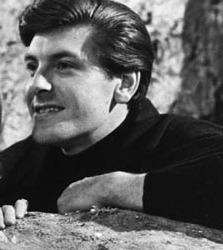

A hypothetical god tier for Steven Taylor from Doctor Who: the Heir of Space.
An Heir of Space is among those who explore physical existence. They are motivated by others to manipulate creation and beginnings. (x)
The Heir of Space struggles with restraint, gets caught up easily, and feels satisfied by the act of making something. (x)
They are the Child Mother, defined by uninhibited creation and beginnings. (x)
Their opposite is the Witch of Time. Their inverse is the Mage of Time.
They share their personality with the Sylph of Life.
The Heir of Space would quest on a planet similar to the Land of Shade and Frogs, reigned over by Echidna (Mother of Monsters) or Demeter (Goddess of Grain). They would rise to ascension on the wings of hummingbirds. (x)(x)(x)
#steven taylor#doctor who#heir of space#classpecting#character classpecting#homestuck#my post#one of my favorite classic who companions!
4 notes
·
View notes
Text
With God, My Life Is No Longer Empty
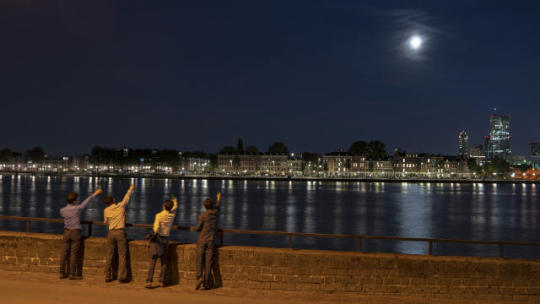
By Si Ming, South Korea
In the early morning, I sat at my small desk by the window, quietly watching the dance and song video The Happiness in the Good Land of Canaan. My heart soared with the melody and I smiled unconsciously. I truly felt the peace and sureness of coming before God.
I Fall Into Sin and Live in Emptiness and Pain
I came to South Korea a few years ago in order to make more money. After a period of hard work, I gradually began to live a more prosperous life, but in my heart I often felt empty and hollow. My friends would often invite me out to eat and drink alcohol, and to go to karaoke bars and the like to sing and dance. Often, we would get home late at night. At that time, popular sayings amongst us were “Seize the day for pleasure, for life is short,” “Get drunk today and worry about things tomorrow,” and “Take advantage of being young to eat, drink and be merry and enjoy our lives, as when we get old, we won’t be able to enjoy anything.” These sayings struck a chord with me and I thought that this must be how we should live our lives. Afterward, every time my friends got together and went out, they always asked me to go with them. It just so happened that I didn’t have anything to do after work and was bored anyway, so I always went with them. When we went somewhere to eat, we would eat and drink like a band of brothers, talking and laughing, and feeling very happy. After eating and drinking, we would go to karaoke bars and other places to sing and dance. After our feasting and revelry, I felt that being with such a big group of friends, talking, laughing, being together with them and having such great fun, was really great. Sometimes, they didn’t want to go out, but I did. In that kind of situation, any tiredness I felt from work, all my frustrations in life and anything I wasn’t happy about disappeared in an instant. Gradually, I came to believe that it was stupid not to eat, drink and be merry in life, and that this kind of life was the only one that brought joy and that lifted me above the drudgery. After work, I drank without inhibition almost every day, but afterward, in my free time, my heart would still feel empty and desolate. I couldn’t help but wonder: Why do people live? How can I fill the void in my spirit?
Although I was feeling all kinds of emotions, life and work had to go on. Because my workmates and I had to stop work whenever it rained, everyone would then go to a mahjong parlor in their free time to distract themselves playing mahjong. They asked me to go along too, and I thought: “I’ll go play for a little while. We have free time anyway. I’ll play mahjong to pass the time and keep myself occupied over these boring days.” And so, I spent all day at the mahjong table, always losing a great deal and not winning much. Sometimes, I would lose between two and three million Korean won a day. While I was playing, I felt really happy and was enjoying myself to the fullest. But after I got back home, things were still just the same old way, and I would feel so terrible for the money that I’d lost. I would tell myself not to play mahjong anymore, but the next day, true to form, I’d be back at the mahjong parlor. I ended up losing more and more, and I even owed my friends money. I hated myself for not being able to exercise any self-restraint. In the beginning, I’d intended just to play to get through the boring times, and just play a bit of mahjong for fun. I never imagined that I’d end up adding such pain to my emptiness. Later on, the work project came to an end and I’d pretty much managed to pay off all the money I owed, so I moved on to another worksite.
After I got there, I continued to get together with my friends and go out eating, drinking and having fun with the money I earned. All it brought me was temporary happiness, and my life was still so empty, so much so that I felt like I was living in a false world. Everyone was friends on the surface—eating, drinking, having fun together, enjoying life—but actually everyone only cared about themselves. Especially when a matter touched on their personal interests, they would attack and judge each other behind their backs. In my spare time, I would often think: “Am I to live my life like this? Countless people around me are all following in the tracks of others. Could it be that there is no other way to live than this?”
What Is the Root Cause of the Emptiness of Human Life?
One day at work, I met Enhao. We got to know each other and told each other everything, and we became close friends. Once, in conversation, I poured out to him all the depression I was feeling in my heart. He said to me, “I’m going to take you somewhere, and all your problems will be solved.” This is how I ended up going with him to church. I told the brothers and sisters about my experiences, and I took the initiative to ask the questions: “Why is human life so empty? How on earth can we rid ourselves of the emptiness and pain of life?”
A sister then said to me, “Brother, these questions that you’ve asked perplex many people. People’s standard of life is now getting better, and we enjoy more and more material pleasures, and yet the void within our spirits gets greater by the day. No one understands why this is, but God’s words reveal the root cause of mankind’s pain and emptiness. Let’s read a passage of God’s words, ‘A world in man’s heart with no place for God is dark, empty without hope. … For without the guidance of God, no matter how much rulers and sociologists wrack their brains to preserve human civilization, it is to no avail. No one can fill the emptiness in man’s heart, for no one can be the life of man, and no social theory can free man from the emptiness with which he is afflicted. Science, knowledge, freedom, democracy, leisure, comfort, these are but a temporary respite. Even with these things, man will inevitably sin and bemoan the injustices of society. These things cannot restrain man’s craving and desire to explore. Because man was made by God and the senseless sacrifices and explorations of man can only lead to more distress. Man will exist in a constant state of fear, will not know how to face the future of mankind, or how to face the path that lies ahead. Man will even come to fear science and knowledge, and fear even more the feeling of emptiness within him. … Man, after all, is man. The position and life of God cannot be replaced by any man. Mankind does not just require a fair society in which everyone is well-fed and is equal and free, but the salvation of God and His provision of life to them. Only when man receives the salvation of God and His provision of life to them can the needs, yearning to explore, and spiritual emptiness of man be resolved.’”
After reading God’s words, the sister continued to fellowship, saying: “God’s words have thoroughly explained the root cause of our emptiness and pain. After we were corrupted by Satan, we began to shun God, and we lost the guidance and supply of God’s words and we lived under Satan’s power, and this is why mankind lives such empty, painful lives. In our lives, we all struggle and rush about for the sake of money, fame and fortune and physical pleasures, and the more we pursue these things, the more unsatisfied and greedier we become. When we obtain these things, our material standard of life improves and our flesh gains enjoyment, but after we’ve enjoyed them, our hearts feel empty once again. When we cannot obtain these things, we feel even more pained and helpless. Therefore, people who have no money or status feel empty and they have no drive in life, and this is exactly how those who do have money and status and great enjoyment in life feel as well—empty and without any drive. Some people have tried many ways to fill the void in their spirits; they go to dance clubs, they smoke and drink, go shopping, go travelling, and some people even try drugs. But no matter what we do, it is all to no avail. This shows that money, fame and fortune and physical pleasures cannot resolve mankind’s emptiness, nor can they make us happy and joyful. We, mankind, were created by God, and only by coming before God, accepting His salvation and living by His word can our hearts feel at ease and at peace, and can we rid ourselves of this emptiness.”
After listening to the sister’s fellowship, I thought again about God’s words, and I felt as though His words had spoken right to my heart. Although I had no worries about being able to afford food or clothing at that time, I still wasn’t happy in life. In order to pass the time and rid myself of my emptiness, I would often go out with my friends, eating, drinking and having fun. At those times, I would feel physically satisfied and would appear, on the surface, to be very happy. But when I got home, especially when I was all alone, I would feel incredibly empty and helpless, so much so that I would feel like I had no goals in life, and that life itself was meaningless. My life of lavish spending, debauchery and uninhibited drinking had brought me only temporary happiness, but I’d never felt true happiness. Perhaps belief in God really was the only way I could solve my spiritual emptiness.
I Have Hope of Ridding Myself of Emptiness
The sister then played a hymn video called If I Were Not Saved by God. This hymn made me feel as though I’d experienced the words myself and, as I sang, every scene of my life played through my mind like a movie. My previous life had been one of uninhibited drinking, not knowing where mankind came from or how we should live, with no goals in life and nothing to look forward to, but instead just muddling aimlessly along all day like it says in the hymn, “struggling painfully in sin, living without any hope.” Moreover, I saw that, after the brothers and sisters in the video began believing in God, they lived free and liberated lives. I found this deeply stirring to my heart and, at that moment, I felt that God truly was capable of saving us from our empty and painful lives, and I wished to continue studying God’s work.
Afterward, through reading God’s words and meeting and fellowshiping with brothers and sisters, I came to understand such aspects of the truth as the source of mankind’s degeneracy, how Satan corrupts man, how God saves man, and how to live out a genuine human likeness. I saw that the words expressed by Almighty God could not possibly have been spoken by any human being, and His words showed me the direction to go in life and taught me what to pursue in order to live out a meaningful life—they were so greatly helpful to me. I later joined the church and often attended meetings and fellowshiped God’s words with my brothers and sisters. I felt very enriched by living in this way, and my spirit experienced a peace and joy it had never felt before.
The Root Cause of My Inability to Resist Temptation
One day, after I’d finished work, my workmates asked me to go out with them. I thought about how I hadn’t been out eating and drinking with them for a long time and how my life had become a little insipid, and I thought it would be great to go out with them and seek some distraction for a while. And so, I went out with them. After I got home that evening, I quietened my heart and pondered: “I now Born into such a filthy land, man has been severely blighted by society, he has been influenced by feudal ethics, and he has been taught at ‘institutes of higher learning.’ The backward thinking, corrupt morality, mean view on life, despicable philosophy, utterly worthless existence, and depraved lifestyle and customs—all of these things have severely intruded upon man’s heart, and severely undermined and attacked his conscience. As a result, man is ever more distant from God, and ever more opposed to Him. Man’s disposition becomes more vicious by the day, and there is not a single person who will willingly give up anything for God, not a single person who will willingly obey God, nor, moreover, a single person who will willingly seek the appearance of God. Instead, under the domain of Satan, man does nothing but pursue pleasure, giving himself over to the corruption of the flesh in the land of mud. Even when they hear the truth, those who live in darkness give no thought to putting it into practice, nor are they inclined to seek out God even if they have beheld His appearance. How could a mankind so depraved have any chance of salvation? How could a mankind so decadent live in the light?”
From God’s words, I came to understand why I was able to believe in God and yet was unable to endure being tempted by my workmates, and why my heart still enjoyed living such a profligate life with them: It was because of the effects caused by the evil trends in society. All manner of popular sayings in society, like such erroneous life axioms as “Seize the day for pleasure, for life is short,” and “Life is short. Enjoy it while you can,” had rooted themselves in my heart. I believed that people should pursue physical pleasures in life and focus on eating, drinking and being merry, and I thought that only that kind of life could bring people happiness and lift them above the humdrum world, and then one’s whole life wouldn’t be spent in vain. Without these things, life felt totally meaningless, and so if I didn’t go out eating, drinking and having fun for a while, my heart began to long for it. Because I was without the truth and I didn’t know what was positive and what was negative, I had therefore become caught up in these evil trends, enjoying sinful pleasures and living a life of uninhibited drinking, degeneracy and decadence. Although my flesh obtained temporary enjoyment, my spirit remained empty and pained, without the correct goals to pursue in life and unaware of the meaning of life. Through the revelations of God’s words, I finally understood that these life axioms belonged to Satan, and that living my life by these ideas and views could only make me lose my direction. If I lived that way, I would regard coveting the pleasures of sin as a positive thing, I would blindly pursue physical pleasures, become more and more debased and I would not have the heart to pursue the truth or follow the right path in life and, ultimately, I would be end up being harmed and devoured by Satan. Thanks be to God for allowing me to see the truth of the matter.
I Find My Direction in Life
I read another passage of God’s words, “” God’s words showed me the direction to go in life. Since I already understood that pursuing physical pleasures was the path of degeneracy, I knew that I should give it up, choose to follow God and walk the path of pursuing the truth and worshiping God. I then made a resolution to diligently pursue the truth, to shun the evil trends of society and never again to live such a profligate life like I had before.
After some time had passed, the Mid-Autumn Festival was just around the corner, and my friends and relatives called me up and asked me to go out with them. Before, I would have jumped at the chance to go out eating, drinking and having fun with friends and relatives on such a holiday, and I would go all out to indulge myself, believing that would make me so happy. Now, however, I had come to appreciate that, only by pursuing the truth, could I obtain a sense of peace and sureness. If I went out with them, I would only obtain a temporary physical enjoyment and it would cause my heart to shun God, and I would still feel empty afterward. And so, I politely declined and then went to church to read God’s words and fellowship the truth with my brothers and sisters, and I felt a sense of happiness and sureness I’d never felt before.
I thought about how I had previously chosen a wrong path, had become mired in the evil trends of society, had coveted the pleasures of sin, become more and more debased and had lost all semblance of a human being, all for the sake of filling my emptiness. It was God’s mercy that had brought me back into His family. Only after I’d accepted the truths expressed by God did I come to have some discernment of these evil social trends and the life axioms of Satan, I came to know what true happiness was and what was most valuable for us to pursue in our lives, and I found the true direction in life. I offer up to God my heartfelt thanks.
1 note
·
View note
Text
The Departure of Eliev
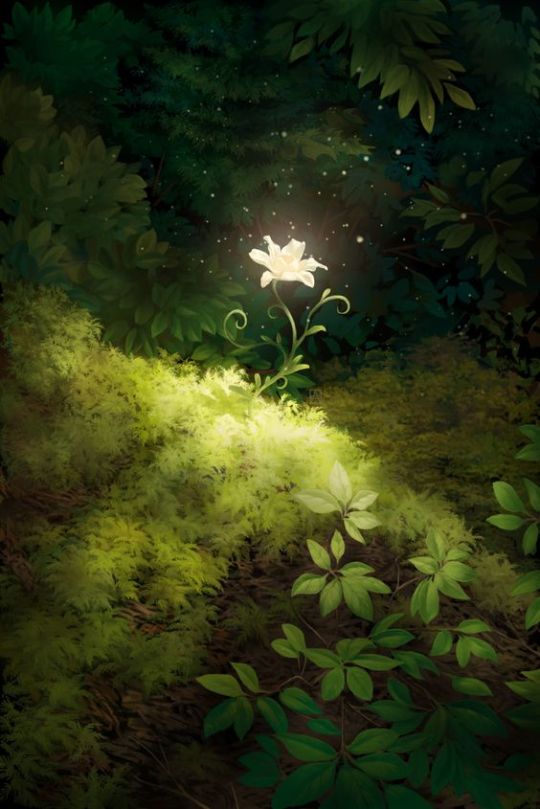
One day, late in winter, as Eliev the Hyldrown trickster was hunkered down and listening to the last rites of the Spirit Oak in a ring of Standing Stones, the great tree suddenly ceased speaking. The birds fluttered off, and the winds stood still. His long, pointed ears perked up at this change. Having run from hill giants, confounded trolls, and outsmarted warlords, Eliev understood that this was not a situation where he would likely be walking away.
Begging patience from the Lord of Trees, he turned and found standing before him within the Standing Stones three figures whom he’d bargained with in the past- Eonvair, Emissary of the Stag God; Tulphrov Xaill, Demon Prince of the Dust Wastes; and Yuxikyu, Avatar of the Summer Queen.
Each represented a potent force not only on Virpresque, but on the Planes of Existence. The fact they’d gathered here together in concert was not a good omen, and Eliev approached the three Councilors with a heavy heart.
“Eliev the Seer, yours travels throughout the Stag Lands are the stuff of legend- Lending direction to lost wanderers, cleansing the land of hate, and contributing to the thriving of my Lord’s people.” Started Eonvair in her ethereal voice of song.
“Eliev the Meddler, you have trifled in the greater affairs of mortals, whose foibles and sin are won’t for exploitation and chastisement,” said Tulphrov, whose many dangling chains jingled upon his pointed horns as he spoke.
“Eliev the Watcher, our fey queen, your lord, sent you forth to observe, not to grow intimate with and change the course of destiny for those in the Material Plane.” Finished Yuxikyu, whose genderless voice nonetheless carried a resonance that commanded attention.
The Hyldrown extended his arms and bowed deeply before this council of archbeings, “Oh Mighty, oh Powerful. My journeys in this land were never meant to disrupt or upset. Rather, my observations and blissful idlings fortuitously led me to such situations as you describe where my presence merely hastened that which had already begun.
“Eonvair, your Master the Stag God keeps watch over his people, yet periodically is called away. It is at these moments the faith of his herd is most tested.” The Emissary held her chin up ever so slightly, aware that the Stag God’s power did indeed wax and wane.
“Tulprhov, the chaos of Abyss is ever flowing, ever churning. Your want for pain has never been slacked, despite my efforts to leave the realms a slightly better place then when I arrive.” The demon chuckled at this, twirling a scepter of jeweled bone between his fingers.
“Yuxikyu, I have cherished every moment in Virpresque as a great gift from our Summer Queen, and like any child given a toy I perhaps enjoyed it too much.” The glowing avatar’s glare narrowed ever so much, for the Queen had oft rolled her eyes and the Hyldrown’s penchant for tomfoolery.
“But where you see tinkering or mischief, I see morals and lessons being provided as a service. The history of the Wevir is upturned, their ancient ways forgotten. The proud Kjollden, capable of so much, are led by pride and fear. If left unattended, both people’s will perish, and the Stag Lands will be rendered barren and dead. Surely none of your liege-lords desire this for Virpresque?”
“Regardless your intentions,” Eonvair stepped in, “it has been decided that your meddling in this land’s fate has proven unmistakably drastic, and given the various, vested interests at play, your license to roam has been hitherto revoked.”
“Your options are thus,” started the Demon Prince. “You may join the Regency of the Stag God, where you will be granted immortality but forfeit all aid you have thus far provided. Or you may join me in the Abyss, where your torments and blood will serve my Master entertainment enough to allow Virpresque to continue uninhibited.”
“Or,” interjected the avatar herald of the fey, “you may return to our Queen’s court for 1000 years, disallowing any further interference, and allowing you to learn greater restraint and wisdom. Your seeds, having been planted, will manifest and play out as the concerned parties of Virpresque’s future will settle their differences without further nterference.”
The Hyldrown knew that no further flatteries nor wordplay would allow him to wriggle his way free from these nigh-omnipotent beings. Rather, he asked for until nightfall to decide. The three Councilors agreed, and in a blink they were gone, granting the wanderer the time needed to plot his final acts of benevolence.
Turning back to the mighty tree of existence, he resumed his testimony to it’s final songs and sorrows, the bowing of it’s limbs enriching it’s dirge with heartbreak and hope. Truly, thought the Hyldrown, the lives of mortal beings permit the full values of existence.
Eliev thanked the tree for it’s gift, and then whispered to it a request of his own. As the sun’s light began to set behind the Stag Mountain, Eliev worked feverishly, reaching deep into his Bag of Holdings and casting powerful spells that connected him, the Way Stones, and the Spirit Oak. In the middle of the grove of the Spirit Oak, he drove his staff deep into the ground amidst the mighty tree’s roots, where it’s vines of magic wove their way into the Spirit Oaks far-reaching roots.
Soon enough, the three Councilors returned. Turning to them, Eliev heavily accepted the offer of Yuxikyu to return to the court of the Summer Queen in the Feywild for 1000 years, unable to visit the mortals of Virpresque. With the Trickster’s fate thus settled, each messenger returned to their respective planes of existence- Eonvair in a flash of brilliant light and thunder, Tulphrov descending into grey mist and fire, and Yuxikyu peeling back the thin wall between Virpresque and the Feywilds. With a forlorn sigh, Eliev the Younger, Trickster Bard, Hyldrown Seer, stepped through the veil into the Feywilds, never to be seen in the lands of Virpresque again.
In the silence behind them, the aged Spirit Oak began to sway in the evening breeze. Through the night, it worked tirelessly to harness the magic Eliev had gifted to it, and spoke with the Way Stones as well. Into it’s leaves and seeds it embedded messages, advice, and warnings from Eliev to be taken by beast or wind to the distant parts of the Stag Lands, and to ensure the stones would continue their watch over the land.
As the sun rose the next day, where once stood the mighty Spirit Oak of the majestic wood, it’s great trunk lay split and broken on the ground. Already it’s bark and wood were being absorbed by the insects, mushrooms, and detrivores of the forest. In the middle of the grove, amidst the stones, the wood, and the earth, near where Eliev the Younger had planted his staff, a single sprout of flower curled gently up to greet the new day.
0 notes
Text
Eliza Bechtold: Has The United States’ Response to the COVID-19 Pandemic Exposed the Marketplace of Ideas as a Failed Experiment?

The fallout from the COVID-19 pandemic in the US has placed a spotlight not only on the fragility of the American economy and the perils of yawning income and social inequality, but also on the dangers flowing from the crisis of truth infecting US politics and American culture more broadly. In particular, President Trump’s purported daily coronavirus ‘briefings’ have morphed into brazen campaign rallies laden with falsehoods and incendiary rhetoric directed at the press, the World Health Organisation, and Democrats, among others. Trump’s sustained and increasingly vitriolic attacks on reporters during the pandemic are especially troubling as they undermine the First Amendment’s basic assumption that the press serves as an important restraint on government.
Additionally, Trump recently voiced support for public protests against stay-at-home orders in states led by Democrats, calling on certain states to ‘liberate’ and save their ‘great 2nd Amendment’, and suggested that coronavirus patients could be injected with disinfectant. While such antics have become commonplace during Trump’s tenure, and Americans are becoming increasingly inured to such assaults on truth, the President’s statements concerning the pandemic provide the opportunity to pause and reflect on how one of the most fundamental parts of the American free speech tradition may be a failed experiment, and what this may mean for the future of free speech in the US.
The Marketplace of Ideas
The marketplace of ideas is premised on the belief that the primary purpose of the First Amendment to the US Constitution is to preserve an uninhibited environment in which truth will ultimately prevail. The Supreme Court holds that the First Amendment recognises no such thing as a false idea, and that however pernicious an opinion may seem, we must depend on its correction not from judges or juries but from the competition of other ideas. For two centuries, the marketplace of ideas has taken centre stage in American free speech jurisprudence, distinguishing the US from other liberal democracies that impose restrictions on speech that is considered to be of little or no value to public debate. For example, the Council of Europe’s approach to speech regulation is predicated on the notion that not all ideas are deserving of circulation in the public sphere and that the right to express one’s opinions may be outweighed by competing societal interests, including the rights of others.
The Assault on Truth in Contemporary American Politics
The current state of American politics highlights the unique challenges to this firmly entrenched principle in the twenty-first century. In 2020, the fact that such a thing as objective truth even exists is a contested notion. Kellyanne Conway, the Counselor to President Trump, introduced the notion of ‘alternative facts’, and Trump’s personal lawyer, Rudy Gulliani, infamously claimed that ‘truth isn’t truth’. As for Trump himself, after three years in office, he has made over sixteen thousand false or misleading claims. Equally concerning, conspiracy theories that were once on the very fringes of the political spectrum are becoming more and more mainstream during the Trump era, fuelled in part by the combination of the President, the internet, and Fox News. In the current political climate, this has led a shocking percentage of Americans to buy into conspiracy theories involving COVID-19, including that the virus is a hoax perpetrated by Democrats to undermine Trump’s presidency, that it is no more dangerous than the common flu, and that Bill Gates, who has voiced criticism of Trump’s response to the pandemic, created the virus and is part of a plot to use the virus to surveil or cull the global population. According to the New York Times, misinformation concerning Gates is currently the most widespread of all coronavirus fabrications, which include 16,000 posts on Facebook and YouTube videos that have been viewed almost five million times. Such theories, along with President Trump, are fuelling the public protests to lockdown orders in several US states. While marketed as grass roots efforts by concerned every-day Americans exercising their First Amendment rights, such activism is in fact being amplified, and in some cases coordinated via social media, by far-right groups that were initially formed with the assistance of Republican megadonors. While the damage flowing from such efforts may be impossible to quantify, there is no doubt that Americans are literally dying as a consequence.
Additionally, Trump’s behaviour as President challenges the principle that government statements, and government actions and programs that take the form of speech, do not normally trigger the First Amendment rules designed to protect the marketplace of ideas. Of equal concern, recent Supreme Court decisions have paved the way for wealthy corporations and individuals to contribute unlimited sums to politicians and causes, including the Koch brothers, who spent $400 million on the 2018 midterm elections alone and have invested massive sums in order to stymie any governmental effort to acknowledge or combat climate change in order to protect their financial interests in the fossil fuel industry. In short, the contemporary ‘marketplace’ is dominated by President Trump and those with the financial means to magnify their voices in order to exercise an outsize influence on law, culture, and politics.
Where Do We Go From Here?
So what does all of this mean for the marketplace of ideas? At the very least, it means that this is a time for serious introspection concerning whether, after 230 years, it is time to rethink this cornerstone of America’s free speech paradigm. To do so would be a significant undertaking, as the marketplace of ideas is interconnected with other fundamental American constitutional principles, including the presumption that viewpoint and content-based proscriptions on speech violate the First Amendment and the conceptualisation of liberty in purely negative terms. Nevertheless, it is important to consider the ways in which the current approach has not only permitted, but arguably fostered, an environment in which a President with authoritarian impulses, and the billionaires backing him, utilise social media in addition to the bully pulpit of office to consistently misinform the public for political gain and undermine democratic institutions, even when the costs of such actions can be measured in American lives.
Moreover, while the ultimate objective of the marketplace of ideas is to reach truth through the competition of ideas, this principle is premised on the assumption that all voices have equal access to the marketplace and that all citizens agree both that objective truth exists and that the goal is to find it, which is clearly not the case in the contemporary US, as emphasised above. Additionally, another fundamental part of America’s free speech tradition is the principle that an informed public is the essence of working democracy. Yet, the US currently has an executive branch that is actively endeavouring to misinform the public on a routine basis and a social media environment in which such misinformation is communicated to the masses with a single keystroke. This reveals a contemporary tension between the US approach to free speech and the health of American democracy.
It is unlikely that the Founding Fathers envisioned the current political environment, led by a President who constantly demonises the press and seems incapable of discerning fact from fiction, and a ruling political party funded by billionaires intent on denying a real and existential threat to the planet. Yet, as it is the government, largely driven by Trump, that is leading the charge on the assault on truth, what are we to do? Surely, we cannot trust the government to adequately address a problem that it is instrumental in exacerbating. At the same time, is the status quo sufficient? The answer to this question must be no, as 230 years of an uninhibited marketplace of ideas has most certainly not resulted in an environment in which truth has prevailed. Therefore, Americans must resist the temptation to view the First Amendment through a lens of philosophical dogmatism and be willing to ask difficult questions regarding whether the marketplace of ideas is a failed experiment. It may also be time to examine how the US approach to free speech may be contributing to the erosion of the most fundamental principles of American democracy, and what should be done about it.
Eliza Bechtold, Durham Law School.
(Suggested citation: E. Bechtold, ‘Has The United States’ Response to the COVID-19 Pandemic Exposed the Marketplace of Ideas as a Failed Experiment?’ , U.K. Const. L. Blog (5th May 2020) (available at https://ukconstitutionallaw.org/))
Eliza Bechtold: Has The United States’ Response to the COVID-19 Pandemic Exposed the Marketplace of Ideas as a Failed Experiment? published first on https://immigrationlawyerto.weebly.com/
0 notes
Text
My Life Is No Longer Filled With Emptiness After I Believe in God
By Si Ming, South Korea
In the early morning, I sat at my small desk by the window, quietly watching the dance and song video The Happiness in the Good Land of Canaan. My heart soared with the melody and I smiled unconsciously. I truly felt the peace and sureness of coming before God.
I Fall Into Sin and Live in Emptiness and Pain
I came to South Korea a few years ago in order to make more money. After a period of hard work, I gradually began to live a more prosperous life, but in my heart I often felt empty and hollow. My friends would often invite me out to eat and drink alcohol, and to go to karaoke bars and the like to sing and dance. Often, we would get home late at night. At that time, popular sayings amongst us were “Seize the day for pleasure, for life is short,” “Get drunk today and worry about things tomorrow,” and “Take advantage of being young to eat, drink and be merry and enjoy our lives, as when we get old, we won’t be able to enjoy anything.” These sayings struck a chord with me and I thought that this must be how we should live our lives. Afterward, every time my friends got together and went out, they always asked me to go with them. It just so happened that I didn’t have anything to do after work and was bored anyway, so I always went with them. When we went somewhere to eat, we would eat and drink like a band of brothers, talking and laughing, and feeling very happy. After eating and drinking, we would go to karaoke bars and other places to sing and dance. After our feasting and revelry, I felt that being with such a big group of friends, talking, laughing, being together with them and having such great fun, was really great. Sometimes, they didn’t want to go out, but I did. In that kind of situation, any tiredness I felt from work, all my frustrations in life and anything I wasn’t happy about disappeared in an instant. Gradually, I came to believe that it was stupid not to eat, drink and be merry in life, and that this kind of life was the only one that brought joy and that lifted me above the drudgery. After work, I drank without inhibition almost every day, but afterward, in my free time, my heart would still feel empty and desolate. I couldn’t help but wonder: Why do people live? How can I fill the void in my spirit?
Although I was feeling all kinds of emotions, life and work had to go on. Because my workmates and I had to stop work whenever it rained, everyone would then go to a mahjong parlor in their free time to distract themselves playing mahjong. They asked me to go along too, and I thought: “I’ll go play for a little while. We have free time anyway. I’ll play mahjong to pass the time and keep myself occupied over these boring days.” And so, I spent all day at the mahjong table, always losing a great deal and not winning much. Sometimes, I would lose between two and three million Korean won a day. While I was playing, I felt really happy and was enjoying myself to the fullest. But after I got back home, things were still just the same old way, and I would feel so terrible for the money that I’d lost. I would tell myself not to play mahjong anymore, but the next day, true to form, I’d be back at the mahjong parlor. I ended up losing more and more, and I even owed my friends money. I hated myself for not being able to exercise any self-restraint. In the beginning, I’d intended just to play to get through the boring times, and just play a bit of mahjong for fun. I never imagined that I’d end up adding such pain to my emptiness. Later on, the work project came to an end and I’d pretty much managed to pay off all the money I owed, so I moved on to another worksite.
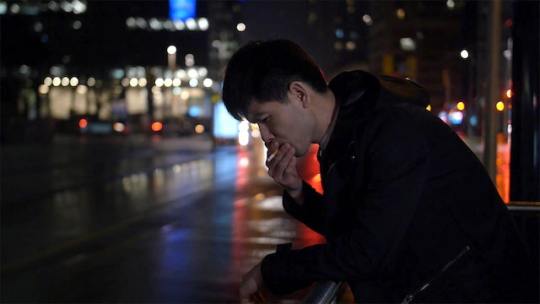
After I got there, I continued to get together with my friends and go out eating, drinking and having fun with the money I earned. All it brought me was temporary happiness, and my life was still so empty, so much so that I felt like I was living in a false world. Everyone was friends on the surface—eating, drinking, having fun together, enjoying life—but actually everyone only cared about themselves. Especially when a matter touched on their personal interests, they would attack and judge each other behind their backs. In my spare time, I would often think: “Am I to live my life like this? Countless people around me are all following in the tracks of others. Could it be that there is no other way to live than this?”
What Is the Root Cause of the Emptiness of Human Life?
One day at work, I met Enhao. We got to know each other and told each other everything, and we became close friends. Once, in conversation, I poured out to him all the depression I was feeling in my heart. He said to me, “I’m going to take you somewhere, and all your problems will be solved.” This is how I ended up going with him to church. I told the brothers and sisters about my experiences, and I took the initiative to ask the questions: “Why is human life so empty? How on earth can we rid ourselves of the emptiness and pain of life?”
A sister then said to me, “Brother, these questions that you’ve asked perplex many people. People’s standard of life is now getting better, and we enjoy more and more material pleasures, and yet the void within our spirits gets greater by the day. No one understands why this is, but God’s words reveal the root cause of mankind’s pain and emptiness. Let’s read a passage of God’s words, ‘A world in man’s heart with no place for God is dark, empty without hope. … For without the guidance of God, no matter how much rulers and sociologists wrack their brains to preserve human civilization, it is to no avail. No one can fill the emptiness in man’s heart, for no one can be the life of man, and no social theory can free man from the emptiness with which he is afflicted. Science, knowledge, freedom, democracy, leisure, comfort, these are but a temporary respite. Even with these things, man will inevitably sin and bemoan the injustices of society. These things cannot restrain man’s craving and desire to explore. Because man was made by God and the senseless sacrifices and explorations of man can only lead to more distress. Man will exist in a constant state of fear, will not know how to face the future of mankind, or how to face the path that lies ahead. Man will even come to fear science and knowledge, and fear even more the feeling of emptiness within him. … Man, after all, is man. The position and life of God cannot be replaced by any man. Mankind does not just require a fair society in which everyone is well-fed and is equal and free, but the salvation of God and His provision of life to them. Only when man receives the salvation of God and His provision of life to them can the needs, yearning to explore, and spiritual emptiness of man be resolved.’”
After reading God’s words, the sister continued to fellowship, saying: “God’s words have thoroughly explained the root cause of our emptiness and pain. After we were corrupted by Satan, we began to shun God, and we lost the guidance and supply of God’s words and we lived under Satan’s power, and this is why mankind lives such empty, painful lives. In our lives, we all struggle and rush about for the sake of money, fame and fortune and physical pleasures, and the more we pursue these things, the more unsatisfied and greedier we become. When we obtain these things, our material standard of life improves and our flesh gains enjoyment, but after we’ve enjoyed them, our hearts feel empty once again. When we cannot obtain these things, we feel even more pained and helpless. Therefore, people who have no money or status feel empty and they have no drive in life, and this is exactly how those who do have money and status and great enjoyment in life feel as well—empty and without any drive. Some people have tried many ways to fill the void in their spirits; they go to dance clubs, they smoke and drink, go shopping, go travelling, and some people even try drugs. But no matter what we do, it is all to no avail. This shows that money, fame and fortune and physical pleasures cannot resolve mankind’s emptiness, nor can they make us happy and joyful. We, mankind, were created by God, and only by coming before God, accepting His salvation and living by His word can our hearts feel at ease and at peace, and can we rid ourselves of this emptiness.”
After listening to the sister’s fellowship, I thought again about God’s words, and I felt as though His words had spoken right to my heart. Although I had no worries about being able to afford food or clothing at that time, I still wasn’t happy in life. In order to pass the time and rid myself of my emptiness, I would often go out with my friends, eating, drinking and having fun. At those times, I would feel physically satisfied and would appear, on the surface, to be very happy. But when I got home, especially when I was all alone, I would feel incredibly empty and helpless, so much so that I would feel like I had no goals in life, and that life itself was meaningless. My life of lavish spending, debauchery and uninhibited drinking had brought me only temporary happiness, but I’d never felt true happiness. Perhaps belief in God really was the only way I could solve my spiritual emptiness.
I Have Hope of Ridding Myself of Emptiness
The sister then played a hymn video called If I Were Not Saved by God. This hymn made me feel as though I’d experienced the words myself and, as I sang, every scene of my life played through my mind like a movie. My previous life had been one of uninhibited drinking, not knowing where mankind came from or how we should live, with no goals in life and nothing to look forward to, but instead just muddling aimlessly along all day like it says in the hymn, “struggling painfully in sin, living without any hope.” Moreover, I saw that, after the brothers and sisters in the video began believing in God, they lived free and liberated lives. I found this deeply stirring to my heart and, at that moment, I felt that God truly was capable of saving us from our empty and painful lives, and I wished to continue studying God’s work.
youtube
Afterward, through reading God’s words and meeting and fellowshiping with brothers and sisters, I came to understand such aspects of the truth as the source of mankind’s degeneracy, how Satan corrupts man, how God saves man, and how to live out a genuine human likeness. I saw that the words expressed by Almighty God could not possibly have been spoken by any human being, and His words showed me the direction to go in life and taught me what to pursue in order to live out a meaningful life—they were so greatly helpful to me. I later joined the church and often attended meetings and fellowshiped God’s words with my brothers and sisters. I felt very enriched by living in this way, and my spirit experienced a peace and joy it had never felt before.
The Root Cause of My Inability to Resist Temptation
One day, after I’d finished work, my workmates asked me to go out with them. I thought about how I hadn’t been out eating and drinking with them for a long time and how my life had become a little insipid, and I thought it would be great to go out with them and seek some distraction for a while. And so, I went out with them. After I got home that evening, I quietened my heart and pondered: “I now believe in God, but does it please God for me to live such a profligate life like the unbelievers? This isn’t how a Christian should act.” So I came before God to pray: “O God! I no longer wish to fall into degeneracy, but I can’t rid myself of temptation. Please help me to overcome these physical desires and temptations.” Later, I read God’s words, “Born into such a filthy land, man has been severely blighted by society, he has been influenced by feudal ethics, and he has been taught at ‘institutes of higher learning.’ The backward thinking, corrupt morality, mean view on life, despicable philosophy, utterly worthless existence, and depraved lifestyle and customs—all of these things have severely intruded upon man’s heart, and severely undermined and attacked his conscience. As a result, man is ever more distant from God, and ever more opposed to Him. Man’s disposition becomes more vicious by the day, and there is not a single person who will willingly give up anything for God, not a single person who will willingly obey God, nor, moreover, a single person who will willingly seek the appearance of God. Instead, under the domain of Satan, man does nothing but pursue pleasure, giving himself over to the corruption of the flesh in the land of mud. Even when they hear the truth, those who live in darkness give no thought to putting it into practice, nor are they inclined to seek out God even if they have beheld His appearance. How could a mankind so depraved have any chance of salvation? How could a mankind so decadent live in the light?”
From God’s words, I came to understand why I was able to believe in God and yet was unable to endure being tempted by my workmates, and why my heart still enjoyed living such a profligate life with them: It was because of the effects caused by the evil trends in society. All manner of popular sayings in society, like such erroneous life axioms as “Seize the day for pleasure, for life is short,” and “Life is short. Enjoy it while you can,” had rooted themselves in my heart. I believed that people should pursue physical pleasures in life and focus on eating, drinking and being merry, and I thought that only that kind of life could bring people happiness and lift them above the humdrum world, and then one’s whole life wouldn’t be spent in vain. Without these things, life felt totally meaningless, and so if I didn’t go out eating, drinking and having fun for a while, my heart began to long for it. Because I was without the truth and I didn’t know what was positive and what was negative, I had therefore become caught up in these evil trends, enjoying sinful pleasures and living a life of uninhibited drinking, degeneracy and decadence. Although my flesh obtained temporary enjoyment, my spirit remained empty and pained, without the correct goals to pursue in life and unaware of the meaning of life. Through the revelations of God’s words, I finally understood that these life axioms belonged to Satan, and that living my life by these ideas and views could only make me lose my direction. If I lived that way, I would regard coveting the pleasures of sin as a positive thing, I would blindly pursue physical pleasures, become more and more debased and I would not have the heart to pursue the truth or follow the right path in life and, ultimately, I would be end up being harmed and devoured by Satan. Thanks be to God for allowing me to see the truth of the matter.
I Find My Direction in Life

I read another passage of God’s words, “When you repeatedly investigate and carefully dissect the various goals of life that people pursue and their various different ways of living, you will find that not one of them fits the Creator’s original intention when He created humanity. All of them draw people away from the Creator’s sovereignty and care; they are all pits into which humanity falls, and which lead them to hell. After you recognize this, your task is to lay aside your old view of life, stay far from various traps, let God take charge of your life and make arrangements for you, try only to submit to God’s orchestrations and guidance, to have no choice, and to become a person who worships God.” God’s words showed me the direction to go in life. Since I already understood that pursuing physical pleasures was the path of degeneracy, I knew that I should give it up, choose to follow God and walk the path of pursuing the truth and worshiping God. I then made a resolution to diligently pursue the truth, to shun the evil trends of society and never again to live such a profligate life like I had before.
After some time had passed, the Mid-Autumn Festival was just around the corner, and my friends and relatives called me up and asked me to go out with them. Before, I would have jumped at the chance to go out eating, drinking and having fun with friends and relatives on such a holiday, and I would go all out to indulge myself, believing that would make me so happy. Now, however, I had come to appreciate that, only by pursuing the truth, could I obtain a sense of peace and sureness. If I went out with them, I would only obtain a temporary physical enjoyment and it would cause my heart to shun God, and I would still feel empty afterward. And so, I politely declined and then went to church to read God’s words and fellowship the truth with my brothers and sisters, and I felt a sense of happiness and sureness I’d never felt before.
0 notes
Text
Find Me A Girl?
Find me a girl in today's world; who loves you solely for your amazingly bohemian behavior; without the tiniest of slang or ostentation adorning your nakedly rustic demeanor? Find me a girl in today's world; who loves you solely for your vivaciously uninhibited spontaneity; without the most infinitesimal of shrewdness or malice tarnishing your soul? Find me a girl in today's world; who loves you solely for your timidly plaintive personality; without the most minuscule of brawn or dominance brilliantly shouldering your personality? Find me a girl in today's world; who loves you solely for the scent of your righteously hard earned sweat; without the most inane trace of contemporary machismo radiating from your countenance? Find me a girl in today's world; who loves you solely for your unabashedly mischievous and uncut nails; without the most insipid tinge of suaveness beautifying your shadow? Find me a girl in today's world; who loves you solely for your vivaciously unpretentious laughter; without the most oblivious insinuation of restraint engulfing your form? Find me a girl in today's world; who loves you solely for your state of glaring nothingness; without the most infidel presence of the currency note in entire of your destined existence? Find me a girl in today's world; who loves you solely for your open-heartedness-your devoting your entire life to humanity instead of praising her; without the most obfuscated tinge of manipulation in your stride? Find me a girl in today's world; who loves you solely for your wholesome renunciation of desire; without the most evanescent inferno of longing running through your intricate veins? Find me a girl in today's world; who loves you solely for your everlasting evolution of an infinite poetic forms; without the most ethereal ingredient of profit enshrouding your destiny lines? Find me a girl in today's world; who loves you solely for your maniacal faithfulness; without the most transient shades of partying; merry-making and socializing; circumscribing your existence? Find me a girl in today's world; who loves you solely for your spirit of tirelessly unflinching patriotism; without the most ephemeral innuendo of homeliness surrounding your silhouette? Find me a girl in today's world; who loves you solely for your untamed footprints; without the most feckless imagery of pragmatic worldly direction evoking your brain? Find me a girl in today's world; who loves you solely for the immortal love throbbing in your heart; without the most orphaned trace of religion; nationality; caste; creed; ever associated with your persona? Find me a girl in today's world; who loves you solely for your insatiably uncurbed fantasies; without the most fugitive beam of earthly saneness; enveloping your identity? Find me a girl in today's world; who loves you solely for your honestly unrestricted tears; without the most invisible trace of contemporary sun-glasses stylishly sequestering your eyes? Find me a girl in today's world; who loves you solely for the pricelessly insuperable humanity in your blood; without the most disappearing ounce of racially discriminating commercialism fortifying your bones? Find me a girl in today's world; who loves you solely for your inimitably unique and profound personality; without the most evaporating iota of spell-binding magic descending down your spine? Find me a girl in today's world; who loves you solely for your pristinely untainted breath; without the most vanishing firmament of state-of-the-art perfume wafting from the pores of your skin? Find me a girl in today's world; who loves you solely for your perennially compassionate heartbeats; without the most threadbare whiff of stardom and cynosure revolving round your palms? And if you did in some impossible way or the other succeed in finding such a girl; then first and foremost prove it to me that she was actually an ordinary human being like everyone of us on this gigantic planet; and not the Omniscient Lord in disguise?
0 notes
Text
The Will of the People (2)
The Public Against the Public Interest
“To the fool-king belongs the world.“
(Friedrich Schiller, 1759-1805)

January 20, 2017 in Washington, DC. Day one of the new age when reality turned liquid. (Screenshot)
Of all the canaries twittering away in the coal mine of Western dystopia, the one that chants about infant immunizations must be among the loudest. The other day I noticed a picture taken during a demo of people opposed to the compulsory immunization of their children. One of the so-called antivaxxers held up a printed sign that read
STIFLE
UNCOMFY
SCIENCE
The words have shock value for they capture the present revolt against reason and empiricism, against what is perceived by many as the unsettling, uncomfy nature of science -- as if it were a stained old IKEA sofa to be dragged onto the sidewalk and disposed of before dawn. The notion has taken hold that if science makes you feel bad, if it doesn't resonate with your inner self, or your religious faith, you can simply reject it. Opt for 'science' you are comfortable with, be it pseudoscience or complete bogus. Or no science at all.
There is of course nothing new about the discomfort caused by science or by any other sort of manifestly rational knowledge. The late German philosopher Norbert Elias (1) explains, as have countless others, how the human species, once it has domesticated the forces of nature, ends up feeling disenchanted. When the world is no longer revealed through religious myth but through reason, it turns out to be a thoroughly unsettling place. Existence itself, stripped of magic and fantasy, is a sobering affair. And the closer nature is examined, the less it shows any sign of making sense. It seems to lack the deeper logic that humans have always craved to give purpose to their short, insecure lives.
In other words, when reality does not match our hopes and dreams, many of us will reject it out of hand. But, says Elias, we have to grow up, we have to get over it: the universe is neither good nor bad, it is blind and doesn't care about us.
There we have it. In a blind universe, not only is there no god and no devil, there is no Santa either.
To make matters worse, observable reality isn't what it used to be. Ever since it came up with the story of Adam and Eve, authority has looked upon factual knowledge with suspicion. Knowledge was and still is equated with arrogance and transgression. For thousands of years, religions have ignored or contradicted rational thinking and have instead provided comfort to those terrified by the unknown as well as to those who revel in it.
But as science is not compatible with religious dogma, so empirical knowledge necessarily challenges ignorance. When science expands as rapidly as it does today, the world inevitably becomes a more disorienting place to people who are suspicious of the modern age and of all its complexity. Rather than bending their convictions to accommodate the evidence before them, they resent science for failing to provide the reassurance that will allow them to sleep at night.
Rational thinking can only go so far. Lacking transcendence and being a purely human enterprise, science is 'only' a process based on the best available evidence and therefore liable to change over time. It does not provide absolute answers and is therefore as powerless as ever against the rigid beliefs suggested by tradition and sanctioned by society.

The quest for unscientific answers never ends (Jehovah’s witness, 2016, Buffalo, NY, USA)
Again, such stubbornness is hardly new. Back in 1801, Friedrich Schiller wrote the famous line that "against stupidity, the gods themselves contend in vain" (in the somewhat less elegant German original: Mit der Dummheit kämpfen Götter selbst vergebens). This leads me to surmise that today's problem is perhaps less with the discomfort produced by scientific relativism as with the word stifle, the aggressive readiness to sweep reality under the rug, to look the other way, claiming it is 'part of a vast cover-up'.
In this respect I may be behind the times. A few years ago I started hearing the argument that reason and science were evil ploys used by the elites to keep the people down. (Tellingly perhaps, the same was said about literacy or correct spelling as another tool of oppression).
Uninhibited anti-intellectualism like this has gained traction. It was adopted by right-wing extremists around the time when hooliganism morphed into political revolt, when the ultras, the heavies, les casseurs emerged from their soccer stadiums and moved into politics - identity politics.
But why? It is easy to point at the effects of capitalism or the intuitions of steamroller materialism (impulse shopping, binge watching, uncontrolled eating...) which in turn have given rise to impulse politics and gut-based decision making as exemplified by Donald Trump. I persist in thinking that at least some of today's populism finds its roots in trash culture, the unrelenting cult of celebrity, in computer games, spectator sports and so-called reality TV, all of which spread symbiotically in the late 20th century.
They ended up infantilizing a broad section of the population and unmooring them from evidence-based thinking. The resulting narcissism of the selfie generation and their lack of empathy then went on to infect the internet (2). Add the rising incidence of educational failure in 'advanced' societies and a new age of ignorance, superstition and triviality has emerged.
With his ample background in reality TV, Donald Trump quickly came to epitomize a post-political age where elections were popularity contests or open invitations to insurrection. The ballot box must look increasingly quaint in an age of web manipulation and click-farming where "influencers" gather vast constituencies of "followers" on Twitter or Instagram.

‘DEUS OMNIA VIDET’: from an all-knowing god to an all-seeing internet. (London,UK, 2018)
The internet has thrown everything wide open. Without reliable gatekeepers to police the discourse or to catch post-factual nonsense, it has given free rein to people who distrust reason and dislike complexity. It also suggests that, just as there is convenient and inconvenient science, there is a good truth and a bad truth, and that one is free to choose between them.
Before the internet became universal, factual reality was better shielded from manifest unreason or scientific deviancy. All kinds of people held all manner of wild ideas, as ever, but there was a cordon sanitaire around them that kept them at a distance. In order to publish scientific findings, for instance, you needed academic credentials and peer reviews. Getting any book published was a big deal. Access to the old media, far fewer in number and therefore more influential, was similarly restricted, ring-fenced, filtered by professionals whose job it was to check and double-check information. Such a system of checks and balances may have been perceived as censorship or elitism by some, but it kept the madmen out of the room.
Not any more. The unmediated democratization of access has meant that anyone with an easy onscreen manner, no matter their lack of qualifications, can build up a following of millions. What works for make-up tutorials on YouTube can also do wonders to subvert the political process.
Liberated from restraint and social control, it wasn’t long before the web turned toxic. It was overwhelmed by conspiratorial fantasies, doublespeak and torrents of resentment.
Conspiracy thinking derives from paranoid disbelief, the haha! suspicion that things are not what they appear to be, and seems to be as intuitive as belief itself. It can be argued that one is indistinguishable from the other.
Belief in alternative medicine, in magic and miracles has been around for ages, as have religious practices such as the refusal to accept life-saving blood transfusions. Sometimes reason and paranoia actually intersect as in the perfectly rational distrust of big pharma. Generally, though, amalgamation is central to conspiracy thinking, as is the malicious disregard for observable reality.
The world changed two days after Donald Trump's was sworn in as president of the United States when photographs showed that the crowds along Washington's National Mall were much smaller than those at Barack Obama's inauguration. Not so, said Kellyanne Conway, a member of Trump's inner circle, they had 'alternative facts'. The photographs were not to be believed, your eyes deceived you. It was a historic moment. Trump's assault on reason, irrefutable facts and the media who report them hasn't stopped since that day.
Needless to say, post-truthism or postmodern disinformation didn't start with Donald Trump. Born-again George W. Bush was famously disconnected from reality, perhaps never more so than when he mistakenly declared war on Saddam Hussein in 2003 or when, standing on the deck of an American aircraft carrier only a few weeks later, he declared 'mission accomplished'.
But Donald Trump has created a matrix of all-out lies, disinformation and utter incoherence that is unprecedented and stands in the way of meaningful governance. Trump declares white to be black, only to reverse himself two minutes later and when confronted with the evidence of what he just said, turns around and says it's fake news. And his political constituency doesn't seem to mind.
Defactualization and magical thinking are now around every corner. Farcical as it may seem, some people continue to embrace the belief that mass shootings in the US are inside jobs staged by actors, that 9/11 was an obvious fabrication or, more insidiously perhaps, that European Union bureaucrats in Brussels are to blame for anaemic vacuum cleaners or dim light bulbs forced upon the United Kingdom.
Facilitated by social media, regression has corrupted politics and fed an us-against-them narrative. After moving into the mainstream with Donald Trump, it was embraced by populist imitators such as Italy's Movimento 5 Stelle (Five-star movement). They swept the elections in Italy's underprivileged, undereducated Mezzogiorno earlier this year. As a result, conspiracy theorists are now part of the ruling coalition in Rome and the incidence of measles is on the rise as unvaccinated children spread the disease. Politics in Poland and Hungary have similarly been upended by paranoia, anti-establishment rhetoric and outright anti-Semitism.
Wave after wave of primitivism and voter rage are destabilizing Western societies. Some of that anger has been a long time coming. Politics has lacked credibility for decades. Europe's leadership has been weak and often asleep at the wheel. In failing to assert its historical legitimacy, the gilded bureaucracy in Brussels has become an easy target of popular fury, no matter how uninformed or ill-advised.
The big, ugly question has become this: what to do, in representative democracies with universal franchise, when the will of the people is increasingly at variance with the public interest?
How can governments be expected to govern when hostile voters support irrational, counterproductive governance? How does the British government go about implementing Brexit, a decision imposed by a belligerent electorate against the country's manifest interest? How can the European Union continue when so many members of its own parliament oppose the very idea of a united Europe?
The Roman empire took centuries to unravel. We live in speedier times.
---------------------------------------------------------------------------------
(1) Norbert Elias (1897-1990): Humana conditio (1985)
(2) ‘They Laughed at Berlusconi’ http://peakwealth.tumblr.com/post/146399295392
See also:
‘Let he RulingClasses Tremble’ http://peakwealth.tumblr.com/post/148844598007
'Autumn in America' http://peakwealth.tumblr.com/post/152990750537
'In Bad Faith (3)' http://peakwealth.tumblr.com/post/137980050202
'In Bad Faith (6)' http://peakwealth.tumblr.com/post/141479058437
0 notes